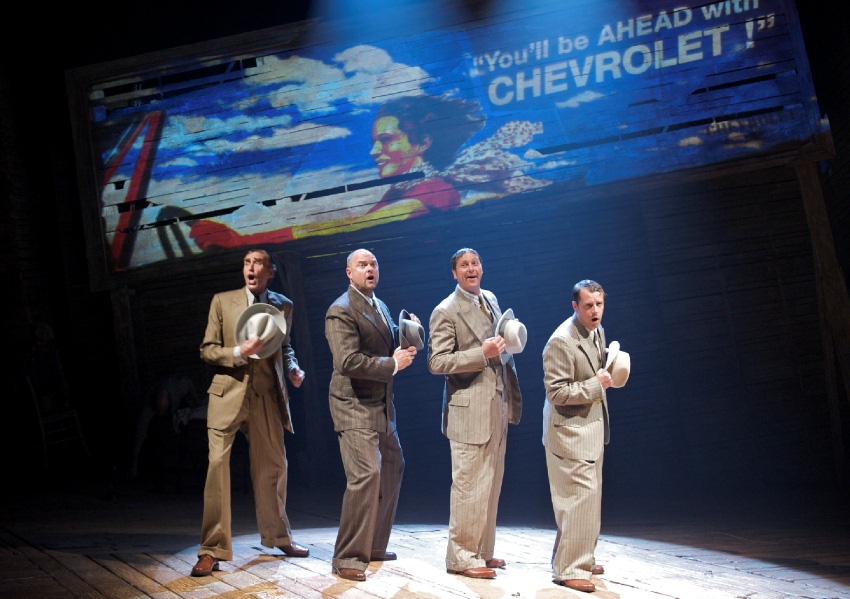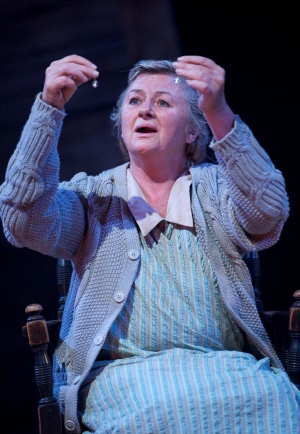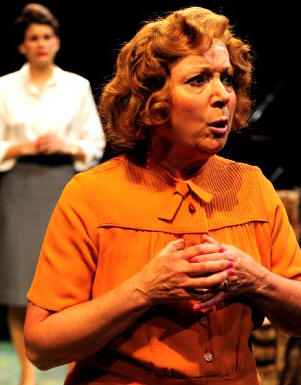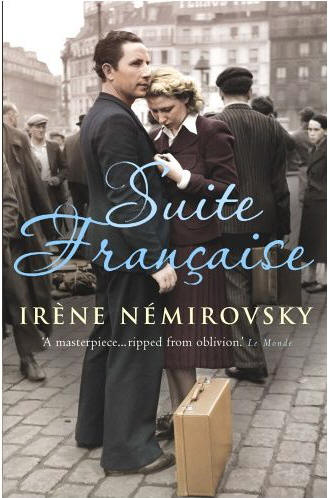Dreamboats and Petticoats
Dreams of Violence
Evita
Dorian Gray
Edward Fox - an evening with Trollope
Kes
Last of the summer wine
La Traviata
Laughter in the Rain
Little Shop of Horrors
The Grass is Greener
Macbeth for Kidz
Madam Butterfly
Matthew Bourne's Swan Lake
Mrs Warren's Profession
The Nutcracker
The Nutcracker (2)
One Man Lord of the Rings
Patrick and Bernadine
Pluck - The Titanic Show
Porridge
Pride & Prejudice
The Entertainer
Radio
Ringside
The Rocky Horror Show
Scrooge
Sleeping Beauty
The Snowman
Snow White on Ice
Harry and Sally back on the road
When Harry Met Sally
Lichfield Garrick
****
IF you had never seen the hit film with Billy Crystal and Meg Ryan then this is a fast moving, witty romantic comedy.
But the problem with stage adaptations of films or
TV shows is the danger that audiences will sit there making comparisons
which is unfair. A play and its performers stand or fall with what
happens on the night not in a film 20 years ago.
There has been a fashion over the past few years to turn hit films into plays with varying degrees of success with the likes of the excellent Rain Man and the less so Legally Blonde and so on.
You can't help but feel there is a degree of cynicism in this trend in that people have already heard of whatever the show is from the original film so advertising is halfway there, it will attract lots of publicity and it will also attract fans of the film even if it is only out of curiosity and, whether good or bad, will probably make money with a short West End run and national tour.
ROCK SOLID
But back to Harry meeting up with Sally and whether it stands the test as a stand alone stage play and the answer is yes. Rupert Hill (Coronation Street and a host of soaps) is excellent as Harry and manages to keep not just an American accent but a New Jersey American accent rock solid throughout.
Harry wisecracks his way through life while Sarah Jayne Dunn (Hollyoaks) is a perfect foil as Sally - attractive and a mix of independent and vulnerable and wanting more out of life than casual sex.
The play is about their relationship. We all know that they will eventually end up with each other it is just a question of when and the answer is 12 years and three months later . . . or just under two hours as far as the audience is concerned.
The pair collect failed relationships along the way running into each other every five years or so for a skirmish until they become just good friends . . . sort of.
Except Harry has a theory that men cannot be friends with women because “the sex part always gets in the way.”
The couple both have failed marriages - to Joe (Callum McCardle) and Helen (Annabelle Brown) behind them so, in the hope of does each other a favour, try to pair each other off with their best friends Jack (Luke Rutherford) and Marie (Kosher Engler) which is such a success that marriage quickly follows - unfortunately for the plan it is Jack and Marie who end up tying the knot.
NEW YEAR'S EVE
The play moves on from the 1989 film so that the finale is set New Year's Eve at the end of the Millennium.
The play is slick and moves at a rapid pace with an open, three level set and voice overs from Marie's video art project of How We Met - interviews with old couples - covering the snappy scene changes which involve whipping a few sticks of furniture on and off.
That scene - the one even people who have never heard of the film know about - is included of course when Sally fakes an orgasm in a restaurant to show Harry men have no idea what women think about during sex and even managed a round of applause. And one of the great punchlines of film was also included to end the scene - to find out go and see it.
With 12 years of action the plot is episodic as we see snapshots of the two lives each time they meet butthe cast manage to keep up the pace so that the interval arrives before you know it and the second half flies by at an equal lick.
It is not great drama, nor demanding much thought, but it is fun and is entertaining. The play runs until 27-3-10 and will also be at Birmingham's Alexandra Theatre from 4-5-10 to 8-5-10.
Roger Clarke
Show that shines through the rain
Laughter in the Rain
Wolverhampton Grand Theatre
****
LAUGHTER in the Rain was the perfect antidote to a wet and
gloomy Wolverhampton evening. A real crowd pleaser, a must for
Neil Sedaka fans and great entertainment for everyone else.
It is yet another Bill Kenright success and the show, which takes
its title from Sedaka's 1975 chart-topper closed to a standing ovation
from the first night audience.
The compilation of Sedaka's music produces almost 3 hours of hits
and 40 songs. Highlights are Happy Birthday Sweet Sixteen,
Calendar Girl and Breakin' Up is Hard to Do. And
the most poignant moment is when, after 30 years collaboration, Sedaka
and his friend form teen years Howie Greenfield part company singing
Our Last Song Together.
This is a great show with slick, seamless performances by all of
cast. Wayne Smith (Danny finalist for Grease the Musical, Ray in
Dreamboats and Petticoats) is outstanding as Neil Sedaka; he captures
the audience from the start with his boyish good looks, enthusiasm and
great voice, on stage throughout he tells his life story through song
and narrative.
Edward Handell (Can't smile without you, Buddy – the Buddy Holly
story) is the geeky Howie Greenfield; his is an understated
portrayal of the man in the background and is done with a creditable
degree of awkwardness.
RAPTUROUS APPLAUSE
Carla Freeman received rapturous applause as Connie Francis and
the audience loved Keiran Brown's interpretation of Tony Christie's
Amarillo; close your eyes and it is Christie. Simon Connelly
brings a touch of comedy as Mac Sedaka, Neil's penny pinching, taxi
driver father while Jade Simpson stands out in her stage debut as
Ronnie, Sedaka's sister.
The bio-musical takes us from the 1950s to the 1970s and charts
the changing fortunes of a good, loyal Jewish boy from a good family
living in Brighton Beach, Brooklyn sharing a small apartment with his
parents, sister and three aunts.
The young Sedaka trains as a classical pianist and wins a
scholarship to the renowned Julliard School of Music and is expected to
become a classical pianist but the teenage Sedaka is drawn to the new
rock and roll sound and he teams up with his neighbour, a geeky poet
called Howie Greenfield.
They write songs together; this is the start of a partnership and
friendship which is to last 30 years. We meet his first girlfriend Carol
Klien (later to be known as Carole King) and follow him through his
early success in the States signed by Don Kirshner, recording for
RCA and writing songs for artists such as Connie Francis (Stupid
Cupid, Where the Boys Are), his marriage to his teenage love Leba
and the birth of their two children.
Then in 1964 the so called British Invasion of the US by groups
such as Beatles and the Rolling Stones brings about the decline of
Sedaka's performing career in the US. In what he calls “the hungry
years” he moves with his family to the UK where he still remains popular
all the while writing songs for artists such as The Monkees, Tom Jones
and the Fifth Dimension.
A meeting with his number one fan Elton John was the turning
point in his career and he is signed to the Rocket Record label and
releases Laughter in the Rain which went to No 1 in the US
charts.
The set works well with authentic photographs projected on to a
cinemascope screen perfectly depicting the mood of the times. The
costumes are accurate but perhaps the costume department could take a
pair of scissors to cut the loose threads trailing from some of the
costumes, The band, led by Pierce Tee, remains on stage throughout
and are barely noticed but for the great musical accompaniment.
The only disappointment, is that Sedaka himself didn't put in a
surprise performance as he did in Bromley last week.
Not to be missed for entertainment value; Loads of fun, great cast
and brilliant music. Highly recommended to dispel those post
winter blues. To 27-3-10
Lynda Ford
Chorus bring colour to Carmen
Carmen
Welsh National Opera
Birmingham Hippodrome
LOOK at any list of the most performed operas and
Carmen is always up there. It has tunes everyone recognises and even
people with no interest in opera, who have never seen one, can tell you
which opera The Toreador Song hails from.
But for most people it also conjures up the vibrant
colours and sunshine of Spain, gypsy girls in swirling farales,
flamenco, castanets amid the passion of Latin lovers set to a backdrop
of the bullfight.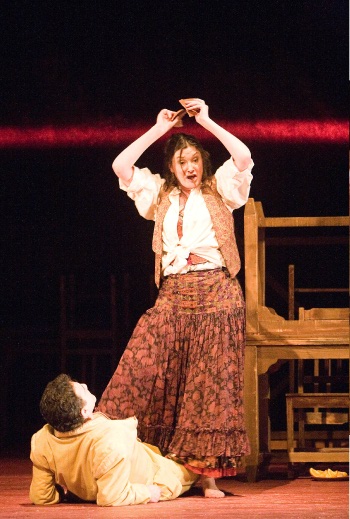
So when the curtains open on a mutely painted back and side cloth and a set comprising of a barrel and a few chairs does not set the pulses racing.
This is a revival by WNO staff director Caroline Chaney of the 1997 co-production with Scottish Opera, directed by the French duo, Patrice Caurier and Moshe Leiser. In it designer Christian Fenouillat has created a minimalist Spain full of gloom where the sun hardly seems to shine.
Lillas Pastia's tavern in Act II makes do with a darkened stage with a few stacked tables vanishing into the gloom while the mountains in Act III have just a fire on stage to warm them.
The parade of the toreadors and excitement of the bullfight in Seville comes down to a line of bowls of oranges - presumably Seville.
BARE ESSENTIALS
After the lavish sets of Seraglio and Tosca it was obvious this production was cut back to bare essentials to allow cast and audience to concentrate on the story, the characters and the passion rather than be distracted by the splendours of Seville, which, incidentally, has a cathedral about the same size as Dudley.
The lighting design by Christopher Forey does manage to convey some atmosphere but empty stages, while certainly not detracting from the action and story, do make extra demands on the cast who have to set the scene as well as tell the story and in the main they live up to it with distinction.
Patricia Bardon in the title role is a delight. She is feisty and alluring full of seductive gestures and tosses of the head, seemingly available but take care . . . she also shows a very hard, sharp edge. Her mezzo-soprano voice is rich and distinctive - and big - but her control is such that she manages the softer, tender moments equally well in a beautifully rounded performance.
Gwyn Hughes Jones as Don José grows into the role somewhat as the naive corporal infatuated with the wild gypsy girl from the cigarette factory who then becomes resigned to life as a bandit to follow her, finds anger when she switches her love to the toreador Escamilla, David Soar, with finally all that passion exploding in the finale.
He has a tenor voice with enough colour and depth to portray both the pathetic and passionate nature of the lovesick corporal seen particularly well in The Flower Song.
HOMELY CHARM
Sarah-Jane Davies as Michaela, the peasant girl, gives a homely charm to the role and showed a fine voice in her Act III area although Soar, as the bullfighter, was a little disappointing. It was a solid performance but somehow he never seemed to command the stage as a major celeb of his day should, again not helped by the lack of set, he is left to convey megastar status all on his own.
In Act IV he is left as an insignificant figure at
the back of the stage as he and Carmen express love for each other and
he vanishes through the back cloth to fight the old bull with no
ceremony never to be seen again.
The final act is also where the excellent WNO chorus get their chance with the most colourful scene of the night with Les voici! voici la quadrille as the crowds cheer the unseen procession of bullfighters arrive in a scene which seemed reminiscent of the race scenes in My Fair Lady.
A technical hitch with a descending front cloth, which had first surfaced at the close of Act III, left Carmen and Don José singing, rather strangely, in front of a gap of about four foot with the empty stage behind, for the dramatic crime of passion ending but, with no way to resolve the situation, to their credit they carried on as if nothing had happened and as if that was how it was planned to be all along. Full marks for that one.
Keeping everything moving along was a lively
interpretation of Georges Bizet's score by the WNO's excellent
orchestra, conducted by the French conductor, Frédéric Chaslin who
managed to inject fun and levity where required yet could command power
and gravitas for the dramatic moments in what was an enthralling
performance.
Applause is always a good indicator of a performance
and last night it was loud and long.
The performance is sung in French with English
Surtitles and is performed again on 20-3-10.
Pictures: Robert Workman
* * *
FIRST impressions can be important, and when the curtain opens for the start of the WNO's production of Bizet's famous opera you couldn't disguise a sense of disappointment.
No real scenery, a dozen wooden chairs, and the well in what was supposed to be a public square in Seville had the appearance of a lagged old oil drum.
Add to that a bunch of scruffy looking soldiers on duty in biscuit coloured uniforms and you might get the feeling this is a budget show.
Happily the quality of the singing helps lift the spirit of the audience, and Patricia Bardon is superb as the gypsy Carmen, even though she is never really dressed to thrill.
The Irish-born mezzo-soprano sings beautifully throughout, while tormenting her many admirers around the cigarette factory where she works.
Gwyn Hughes Jones parades a powerful voice as Corporal Don Jose who falls for Carmen after arresting the fiery female when she is involved in a fight with another woman in the factory. But the required chemistry between the pair is not always apparent.
David Soar is sound as the brave toreador. Escamillo, whose love for Carmen leads to the final fatal showdown outside the bullring, but even that key scene is marred by the lack of a decent set - ten baskets of oranges has to do the trick.
The opera is sung in French with English surtitles, but the electronic screen is so high up that people in the stalls risk ricking their necks reading the words while watching the action.
Paul Marston
Death in Rome: The artist Cavaradossi awaits the firing squad as his lover, the diva Tosca stands by ready, she believes, to escape with him to exile. Pictures: Brian Tarr
Tosca
Welsh National Opera
Birmingham Hippodrome
****
YOU can't beat a good baddie, if that is not
an oxymoron, and Robert Hayward (pictured below) as Baron Scarpia is one
of the best.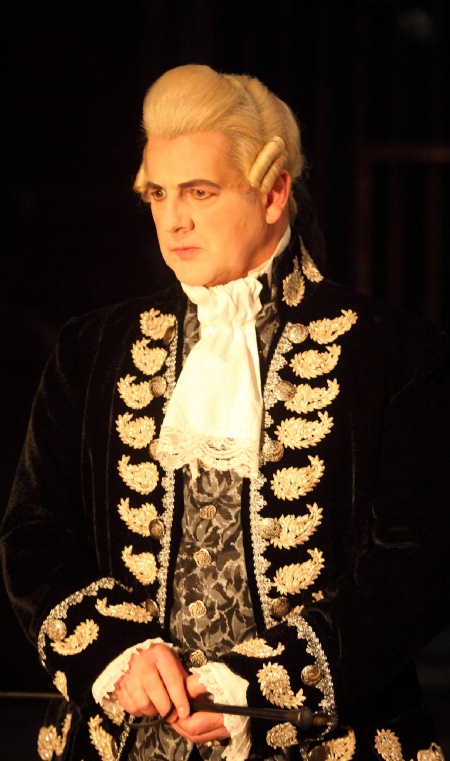
Old Scarpia is evil, debauched, cruel, a sexual
predator, sadist and in the hands of Hayward, blessed with a sublime
baritone and menacing stage presence. In the unlikely event opera roles
should dry up a career in panto is assured.
His sly, manipulating chief of police in the political turmoil of 18th century Rome is the mortar which holds Puccini's dark tragedy together. Not a lot of laughs in this one and Hayward manages to keep that air of cold, calculating menace without once drifting into the realms of Victorian melodrama.
Tosca is one of the most performed of all operas and
it is easy to see why. It has strong arias, soaring music, and is a
tragic tale of love amd death with all three leading roles having to
rise Lazarus like from the dead for the curtain calls.
The audience were greeted with the news that they had a new Tosca for the evening, Portuguese soprano Elisabete Matos being indisposed. She apparently did her back in with a somewhat too realistic death leap from the parapet in the finale in a performance in Cardiff - method opera perhaps?
But the audience were
certainly not short changed by Cornish replacement Naomi Harvey
who brought tenderness, anger and fury and a fine voice to the role and
blended well with Geraint Dodd who played her lover, the painter Mario
Cavaradossi, no more so than in Trionfal...
di nova speme in the final act when the
pair believe they have cheated death with a deal with Scarpia - despite
Tosca having done him in with the old carving knife before the second
interval.
Her aria Vissi d'arte was particularly moving in Act
II as she realises that to save her artist lover she will have to submit
to the magnificently evil Scarpia.
Puccini's haunting tragic clarinet theme and the
aria E lucevan le stelle, is one of the best known in opera and the
emotion could be felt as Cavadossi, awaiting execution, pours out his
heart in a last message to his lover, Tosca, ending with the despair of
‘And never have I loved life so much.”
This is a big production and his aided by big sets
by designer Ashley Martin-Davis and clever lighting design from Mark
Henderson with the gothic gloom of the church of Sant'Andrea della Valle
being cut like a knife by the sunlight outside each time the door opened
or the implied evil in the red glow from the en-suite torture chamber
off Scarpias's apartments in the Palazzo Farnese.
There was even a touch of political comment with the
enormous feet of a huge crucifix in the church and the giant
grotesque complete with sword dominating the parapets of the
Castel Sant'Angelo in the final scene more reminiscent of a Fascist Rome
of Mussolini than the battle between Napoleon's France and the Bourbon
reactionary party and its cleansing of republicans, artists, writers,
intellectuals and anyone who might be a threat.
The orchestra under Lothar Koenigs also deserves
credit for giving full rein to Puccini's sumptuous score in what is a
fine production. Tosca, in Italian with English surtitles, is performed
again on Friday, 19-3-10.
Roger Clarke
Another Voice . . .
****
HOW theatre-goers love a good villain! In Puccini's
great opera, set in 1800 Rome, cruel police chief Baron Scarpia uses his
power in an effort to seduce the famous diva, Floria Tosca, as well as
torturing political prisoners.
Not the most popular person, you might think, but
Robert Hayward filled the role with so much menace and sang with such
power and passion, he fully deserved the cheers he received from a
thrilled audience.
Scarpia tries every trick he knows to win Tosca's
favours, but she has other ideas despite the death threat hanging
over her lover, the painter Cavaradossi, and the outcome is a
heart-rending finale.
Naomi Harvey, who took over the role of Tosca at
short notice, sang and acted beautifully, joining Geraint Dodd (Cavaradossi
- pictured right) in memorable duets, while the arias Recondita armonia,
Vissi d'arte and E lucevan le stelle were superb.
The action switches from the Church of Sant'Andrea
della Valle, to the Palazzo Fernese and finally the Castel Sant'Angelo,
and in each case the sets and lighting add hugely to the overall effect.
The final scenes involving the appearance of
Cavaradossi in front of a firing squad and Tosca's leap from the castle
parapet, were gripping and realistic.
Full marks to the orchestra, conducted by Lothar
Koenigs, and director Michael Blakemore.
Paul Marston
Return of the king of one man movies
One Man Lord of the Rings
Lichfield Garrick
****
I SUSPECT that few Tolkien fans out there realise that hidden within the Rings trilogy are references to Elvis, Edwin Starr and Johnny Cash.
They are easy to miss but thanks to Charles Ross, the Canadian master of the one man movie genre their true place is restored within the epic which he manages to condense to an hour and ten minutes.
We could have enjoyed this show five years ago had it not been for a
legal wrangle with the movie makers which was only resolved last year
just in time for the Edinburgh Festival where Ross was a sell out.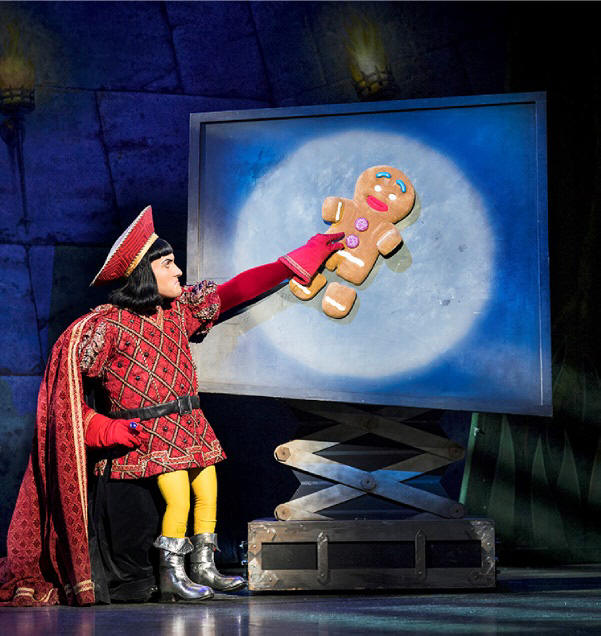
In just a black boiler suit and minimal lighting Ross brings the entire trilogy to life on stage with a staggering range of voices and sounds he creates without special effects and even had to overcome a microphone problem after about 20 minutes.
REFERENCES
Ross though, rather than battle on, added a short break while he changed his mic and then slipped in references to it throughout the show.
He becomes Gollum, Sam, Frodo, Gandalf, Orcs, Ents . . . all the characters of Lord Of the Rings in what is part tribute, part storytelling and at times very funny with asides and references that the films somehow missed out. Strange that but all very obvious when Mr Ross points them out . . .
His one man Star Wars was critically acclaimed and this is its equal for sheer inventiveness and skill although the amazing thing was that there were people in the audience who had neither read the books nor seen the films. What they made of it all the Lord only knows. It must be a bit like going along to a book club to discuss a book you had never heard of.
Sadly it was at the Garrick for just one night but check the website to see if it will be appearing at a Shire near you. It is well worth seeing . . . if you have seen the films, DVDs or read the book of course - otherwise it is a man rushing, creeping and writhing across the stage doing silly voices for no apparent reason.
Roger Clarke
High School Musical 2 is a teen and children's phenomena so it seemed only fair to have two generations of reviews - one from a more mature viewpoint, from the old stag still nobly commanding the herd . . . all right, one from an old fogey . . . and another one from someone a bit closer to the current century
High on spirit, entertainment and fun
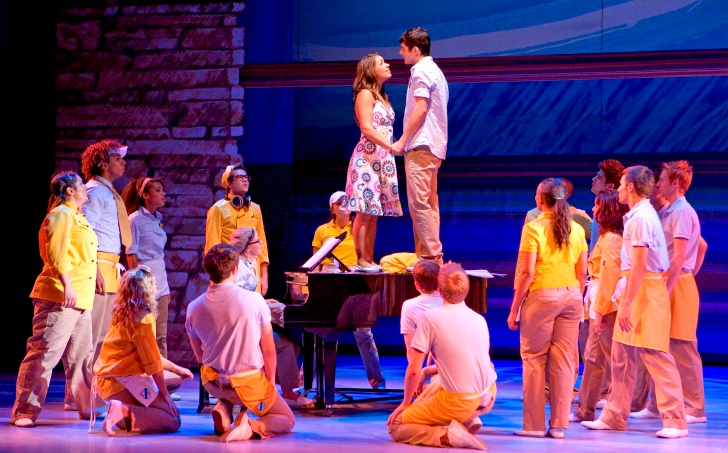
You are the music in me: Troy, Liam Doyle and Gabriella, Nikki Mae with the Wildcats
High School Musical 2
Alexandra Theatre
****
AS you get older you forget just how much noise a small child can make. When that small child becomes hundreds of small children then you get that high pitched hum that vibrates around swimming pools on hot days in the summer holidays.
It is called excitement, unbridled joy, and last night the Alexandra theatre was awash with it as the Disney Channel phenomena High School Musical 2 started its run for the Christmas season to a sea of well-scrubbed and well enchanted faces.
As the children still had that look of excited wonder as they left it looks as if the Alex has found itself a festive hit, and why not?
This is not the best musical ever written, nor does it have much in the way of memorable music while the script is predictable and all in all it is a bit sugary and lightweight but it is full of energy, packed with enthusiasm and, let's be honest, it's great fun.
It is slick, very professional, well performed and infectiously entertaining and if a few hundred kids go home after each performance thinking a theatre is the most magical place on earth then it is a show worth its weight in gold. Another generation has been hooked.
The franchise is the most successful in the Disney
Channel's history and the original made for TV movies rival events such
as World Cups in the number of viewers – although the World Cup probably
sells more beer.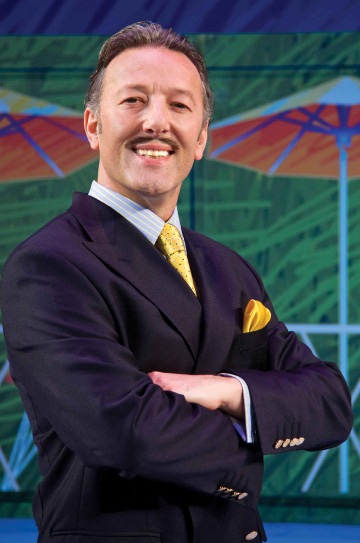
The original had a hint of Romeo & Juliet go to the local comp via West Side Story about it with Troy and Gabriella in rival factions before it all comes right in the end.
With a smash hit on their hands High School Musical 2 was a formality followed by 3 and now 4 is in the making.
The current stage musical follows the movie with spoilt rich brat Sharpay Evans, a deliciously bitchy Lauren Hall, persuading daddy to employ basketball star Troy, a clean cut Liam Doyle, at his country club for the summer so she can have him all to herself.
GODSEND FOR OLDIES
Troy though persuades Mr Fulton to employ Gabriella, sensitively played by Nikki Mae, and the rest of the gang from school.
And hurrah for Mr Fulton, played by Ian Reddington, (pictured left) who was a godsend for us oldies in the audience – he even had a moustache. It was reassuring to know there was at least one member of the cast old enough to shave regularly.
Sharpay tries every trick she can to split up Troy and Gabriella and when she can't sack all their friends tries to make life so difficult they will leave but this is Disney so it all builds up to a happy ending.
Troy and Gabriella's duet You are the Music in Me was a highlight while other notable songs were Work This Out and All for One but a lively cast made sure every musical number kept feet tapping.
Sound was a little patchy at times, with vocals being drowned out on a couple of occasions but this was a first night and the tech crew should have that sorted by the next show.
Worth a mention are the orchestra, under musical director Mark Crossland who kept things moving at a cracking pace and a stage crew who did a brilliant job in shuffling sets in the wings to make sure scenes changed seamlessly.
The whole cast were excellent and seemed to be enjoying it as much as the kids watching it and deserved their standing ovation - even though at least two tots standing and cheering were actually taller when they were sitting down.
Children will love it and so will their parents. To 02-01-10
Roger Clarke
The old fogey
High School Musical 2 - (a not so guilty secret)
****
 Before
this review begins I have three things that should probably be declared.
Before
this review begins I have three things that should probably be declared.
Firstly, I am young (well youngish - I still make it into the
29-34 banding in questionnaires).
Secondly, I am a man. (A cage-fighting, hairy, modern day Sean
Connery I am not, but a man I most definitely am - I like football. I
don't very much like musical theatre)
Thirdly, I am a fan of the High School Musical franchise. (In
fact, I'm so much of fan I can even call it HSM!)
Yes, yes, yes I realise that points two and three don't
necessarily dovetail with each other. And yes, I also realise that point
one puts me well outside the catchment area of the HSM fan base
demographic. But I don't care. I think it's great; In fact I'm a hop,
skip and a stage school jump away from blowing my entire disposable
income on the avalanche of HSM goods flooding the shops.
The films are fun, fluffy and accessible. They don't tax either
your brain or your moral compass, instead planting American earworms
that live FOREVER.
So, it was with a degree of trepidation that I approached the
Alexandra Theatre to watch High School Musical 2; for what would ways
could they devise to sully my cherished movie franchise?
The good news is . . . none. The spirit of East High School is
fully intact. In fact, it was the most fun I've had in the theatre for a
long time. There isn't Shakespeare's dialogue, Brecht didactic agenda
nor Gilbert and Sullivan's songs. But there was more fun than you could
poke a wildcats cheerleader twirling baton at.
The stage show maintains the ultra positive, happy go lucky feel
of the screen. The teen angst on show is of the diet variety and the
baddies of the piece (a superb Ian Reddington, Loren Hall and Matt
Kennedy - aka Mr Fulton, Sharpay and Ryan, respectively) are really not
so bad, In fact, away from the smoochy conundrums facing Gabriella and
Troy, it is these three characters which provide the winning formula to
the piece. They keep the humour levels high and also mean that the event
does not fall into sugar overload.
Loren Hall is the star of the show but then she has also got the
scenery chewing Sharpay on her side. Another excellent performance was
via James Lacey's Jack Scott. He, along with Emma Dukes' Kelsi, managed
to make the subsidiary characters just as watchable as the big 5.
Away from the principle characters, the ensemble songs are
actually better than the movie. They may be without the big budget but
the lack of a specific camera shot means that the eye can wander through
musical set pieces such as ‘work this out' and ‘what time is it' and can
truly take in the talent and effort on display.
Special mention should also go the stagehands in the chorus line,
who did their job so well that the frenetic pace never faltered and the
scene changes never looked laboured.
Fortunately you don't need a PhD in HSM to know what's happening
in the musical. It's easy for those uninitiated in the ways of the
Wildcats to pick up what's going on (just ask my elderly parents who
accompanied me to the Alex) [not so much of the elderly AND I
seem to remember you came with us - Ed!] Conversely though, the
stage production is like putting on a favourite jumper - it's just so
darned comfortable.
There's enough of the film to give the audience that connection to
the movies and even the more complicated scenes such as the Golf Course
Washout, are still included - crucially with clever staging meaning that
it doesn't lose its impact or look contrived.
Similarly the relationship between Troy and Gabriella (an
effective pairing of Liam Doyle and Nikki Mae) has enough oomph in it to
satisfy the young audience.
Overall I would recommend the production to anyone who likes the
High School Musical Movies . . . but then I'd also recommend it to all
those that don't.
No frog or pig but still a classic

A Christmas Carol
Birmingham Rep
****
THERE have been so many versions of Charles Dickens' A Christmas Carol over the years that sometimes it's difficult to remember the true ethos of the tale. Acting greats such as Walter Matthau, Derek Jacobi, James Earl Jones, Michael Caine, Tim Curry and Jack Palance have all taken on the pivotal role of Scrooge but then so has Ross Kemp so its fair to say that not every incarnation works.
Now in my mind a person always has a quintessential version which they remember above all others. For me, somewhat bizzarely it's A Muppets Christmas Carol. Yes I've seen better re-tellings (Bill Murray's excellent Scrooged) and many a production that has both gravitas and a cast that has nether a frog nor a pig, but that's the one I remember and I tell you this without a hint of shame. I tell you this not because of a need to confess but because I think that this tale is special.
As December begins its assault on the senses The Rep welcomed a true
Christmas classic through its doors.
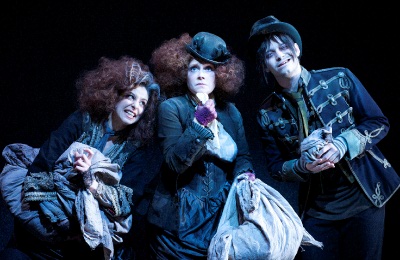
So it is with great relief that I can say that the latest version to be thrown into the mix is not without merit, indeed it's rather good, and not just because it has puppets.
From the very first moments of the show it was clear that this production was unlike many before it, it was less muppets and more Tim Burton. The ghosts of the opening scene were powerful and acted as a fine indicator of what lay in store.
FEELING OF COERCION
From the off we are told of the elaborate plot to steer Scrooge from his evil ways and this feeling of coercion is a neat way of drawing the audience into the plot, in a way that makes them feel almost part of the show. This feeling is further strengthened by the fact that the actors enter the stage from within the audience at various points, a fact which came as quite a shock to a couple who were late and as such greeted by a screaming choirboy.
The set designs and changes were quirky, atmospheric, imaginative and expertly executed throughout. From the tiled floor to the explosions, yes I said explosions, the whole stage drew you in and was genuinely enchanting and occasionally startling for old and young alike.
Despite occasional problems hearing the lyrics, the songs were vibrant;
particularly the ensemble pieces, Fezziwig's factory was a highlight
with Sevan Stephen and Melanie La Barrie as the Fezziwig's earning
special mention. Throughout the choreography was
lively and expressive and fundamentally controlled the pace of the
production. The company as a whole were excellent and
effortless switched roles.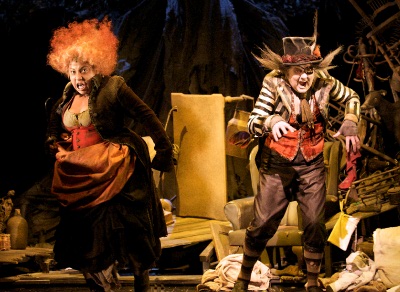
Peter Polycarpou as Scrooge was a strange mix of The Penguin from Batman Returns and Bob Hoskins, but somehow made it work for him in a way that engaged the crowd in the lighter points of script while managing to convey the more dramatic moments with a subtlety and tenderness which grew with the plot.
WONDERFUL ENTRANCE
And what of the ghosts - for we are left in no doubt that this is a ghost story? Russell Dixon as Jacob Marley gave a performance worthy of his wonderful entrance. Colin Ryan as the ghost of Christmas Past was entertaining and did well, but one felt that there was more to come from the young actor, if he could just find a way to express it. Dale Meeks was sadly underused as the Ghost of Christmas present but worked the crowd well when he could. Vlach Ashton managed to say everything by saying nothing as the ghost of Christmas Yet To Come , which is no mean feat and as he also played Dick Wilkins I can confirm that this was not due to muteness. The rest of the company at one time of another played a host of ghost, some in modern day attire, which was a nice touch. This acted as a very effective narrative device and managed to successfully tread the line between being stimulating and distracting.
The children within the production were excellent and rightly deserved their applause at the end. For the roles of smaller children, including the ever present Tiny Tim, puppets were used, operated by members of the company, with a combination of a ventriliquists stance or by having them strapped to their feet.
VERY EFFECTIVE
This was I'll admit a little off putting at first glance, but quickly became very effective. Particularly so for the younger members of the audience, as it was a way of firstly drawing children into the story and crucially allowed the production to portray potentially upsetting scenes such as those of a child's death with a sensitivity which made the event both touching and accessible to children. For this the production should be commended.
Special mention must also go to Poppy Tierney who stepped in at the last minute as Lydia Cratchit and Mrs Dabchick and was excellent as both.
The Rep also made an effort for the younger audience. The programme was very nicely presented in language that was befitting of its demographic for the night. Equally it was both informative and fun with a wordsearch; which I'm proud to say I was able to complete with minimal assistance.
As I said at the beginning of this review, there is a darker twist on the tale in this production and in my opinion the experience is all the better for it - although I would say that this may not be suitable for very young children or indeed asthmatics of a nervous disposition as there is a lot of smoke.
Overall I must say that I went into the evening rather like Scrooge himself. I was cynical at the beginning but left the auditorium full of the joy's of Christmas . . . I can offer no higher praise. To 9-01-10
Christian Clarke
Wee Jimmy steals the show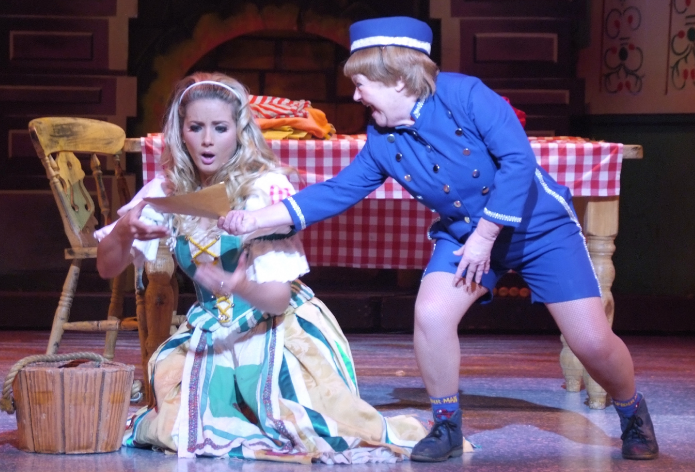
Ticket to ride: Cinderella (Danielle York) is handed an invitation to the ball by Buttons (Janette Krankie)
Wolverhampton Grand
****
A FLYING grandmother might impress the kids but a
flying full sized Pagasus with galloping hooves and flapping wings
pulling a coach carrying Cinderella and the Krankies? That is something
else - especially when it turns and heads off up into the heavens to
appreciative applause.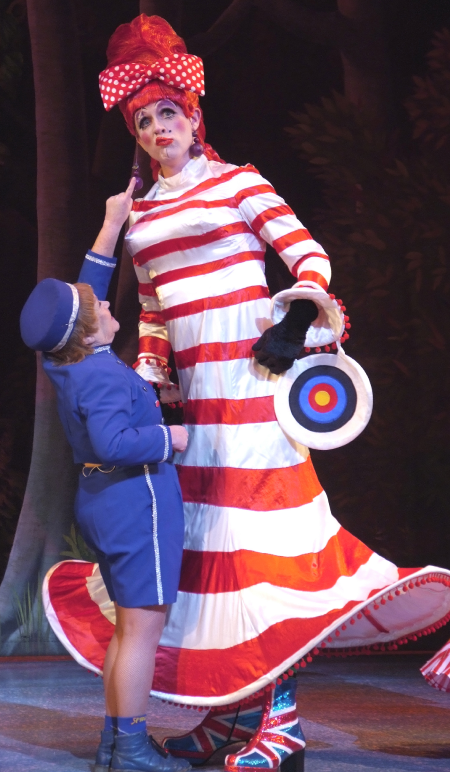
It certainly beats the Shetland pony and a man with a shovel – not that the Grand's Cinderella needed any flashy special effects mind you, it does very nicely on its own thank you very much.
It is almost a traditional panto. Almost in that there is not a principal boy to be seen while Prince Charming's loyal friend and servant Dandini is turned into an evil villain – arriving as a sort of Richard III does panto – my kingdom for a flying horse and all that.
SCUPPER
From the outset we know he is out to scupper the chances of his cousin Prince Charming (Nic Greenshields) of marrying and inheriting the kingdom and Stefan Dennis, (Paul Robinson in Neighbours) manages the role with panache. He seemed to thoroughly enjoy himself as a panto villain adding his little touch of evil among the glitz.
He had one small girl so convinced he really was a baddy that she shouted out to the cast to grass him up at the end without any prompting whatsoever.
For real baddies though you need the ugly sisters Trinny (Ben Stock - pictured right wuth Janette Krankie) and Susannah (Nathan Kiley) with their collection of ever more outlandish frocks. They are bad enough to get the children booing and have some nice touches and pure evil in their treatment of their sweet sister, the saintly Cinderella (Danielle York).
Looking after her to make sure not too much harm comes to our heroine is former X-Factor contestant Niki Evans with a touch of Black Country magic – a sort of Furry Godmothers-am- we. Her role is to ensure old Cinders ends up with the shoe on her foot and the prince on her arm for the happy ever after bit at the end and it is one she manages well.
Running through the whole show though are the Krankies, with Ian as Baron Hardup and Janette as Buttons. The Scottish husband and wife duo, now 62 and supposedly semi-retired - have been in the business for more than 30 years but to last that long you have to be doing something right.
Their appearances on children's TV programmes could make Christmas cracker jokes look sophisticated but give them a live audience and they too come alive with a mix of the outright daft for the kids and lines, such as ‘Memories' that had the kids baffled and adults roaring with laughter.
We had a bit of smut, a bit of silly, their variation on a ventriloquist act, bags of charm and lots of laughs. Without the Krankies it was a good panto, with them it was very good.
Technically there could be some improvements. The sound needs a bit of tweaking and the smoke, rather than dry ice, left a couple of scenes being performed in a fog but those are minor gripes. If you are looking for a traditional(ish) panto that is slick, lively, fun and which kids and maiden aunts will enjoy and which won't frighten the horses, then add this to the list. To 31-01-10
Roger Clarke
Shahrazad opens a world of wonder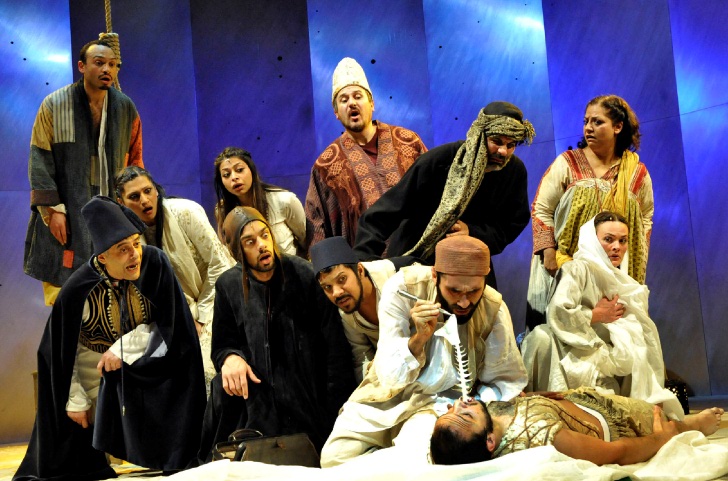
A fishy story: The doctor (Rene
Zagger) brings the little beggar (Simon Trinder) back to life to the
amazement o the company (All pictures - Keith Pattison)
The Royal Shakespeare Company
Courtyard Theatre
*****
START with beheadings, throw in a body hacked in four and the bloody bits hung from ropes, add a giant, snake eating bird, a corpse eating sorceress, people turned to rocks and, for good measure, a remarkably loud and powerful bodily function and you are automatically on a winner with kids.
Add some engaging acting, clever direction and a tale told at a
galloping pace and you grab the parents as well. We all know this is the
panto season but this is panto with an A-level, witty, at times scary,
sophisticated and great fun.
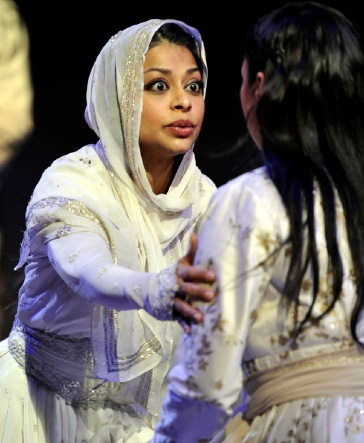
There are apparently 400 registered storytellers in Britain but you can now make that 401 as the cast of 18 bring the story of Queen Shahrazad and the thousand and one nights to life.
Dominic Cooke's adaptation was first performed at the Young Vic in 1998 and he has brought this new adaptation to the RSC with a cast double in size and a freshness and enthusiasm which is infectious.
The Courtyard lends itself to characters appearing or leaving through the audience and Cooke's hands it also means the stage can empty and fill in an instant as the cast become the 40 thieves on horseback, the cliff hiding the entrance to Ali Baba's cave and even the treasure itself.
SINGING TREE
They become a swarm of bloated flies, a singing tree and an impressive, giant flying roc, the bird that hunts the valley of diamonds in Es-Sindibad's second voyage – they are even a crowd of people now and again.
The king, betrayed by one wife, has her executed and then marries a new bride each day for just one night, executing each one at daybreak. His latest bride Shahrazad can keep alive only by telling fabulous stories, so intriguing that the king will spare her each dawn to hear a new story each night.
The original Arabic book was A Thousand and One Nights although in truth
there were only about 260 stories and the RSC only manage six which
involves some quick changes by the cast who play several
parts each as the audience is led from story to story
The whole performance has to be an act of collaboration with the audience, this is theatre by consent. The only scenery is imagination. The actors provide an often brilliant framework, as with the people turned to black rocks, or the open sesame cave but it is then up to the audience to complete the jobs and build the picture for themselves.
Ayesha Dharker provides the guide for the audience as Shahrazad, (pictured above) setting the scene for each of the stories which she convinces us are the only things keeping here alive as she slowly seduces the king, Shahrayar (Silas Carson) with her tales until he finally learns to love again. . . ahhh. You even get a love story to boot.
Shahrazad takes us to the world of Ali Baba, of the little beggar, of Es-Sindibad, Abu Hassan's flatulence problems, the wife who won't eat and the envious sisters.
FLESH EATING
Simon Trinder is full of fun as both Ali Baba's brother Kasim – he's the one who gets cut into quarters – and the beggar who supposedly dies eating a fish but whose corpse has a contortionist's life of its own while Jene Leaney gives a spirited performance as the flesh eating sorceress who could win the Grand National.
Chris Ryman is another stalwart as the cobbler who can cobble bits of bodies back together – a man whose silence comes at a price - and the man who has no concept of silence who can rattle theatres when he breaks wind.
Mixed in among the actors there is also some effective puppet work with Es-Sindibad, the roc and the bird that talks.
Arabian Nights is not a Christmas show as such, it is not a Middle Eastern Christmas Carol or anything like that, but if Christmas is a magical time for children – and adults - then this has a magic all of its own, family entertainment that will enchant young and old and will fire even the dullest imagination. Take the family to the panto this Christmas to keep a tradition alive but then take them to Arabian Nights to keep imagination alive. To 30-1-10.
Remember also to buy a programme which is packed with puzzles and games for children. There is even a falafel recipe and plans for an origami eagle and as well as all that it is also a programme – a bargain at £3.50.
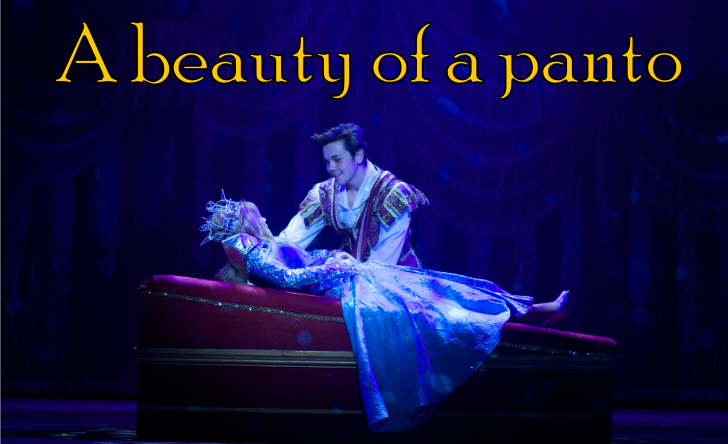
Wakey Wakey: The Prince (Ray
Quinn) brings Princess Beauty (Lucy Evans) back to life with a kiss
Sleeping Beauty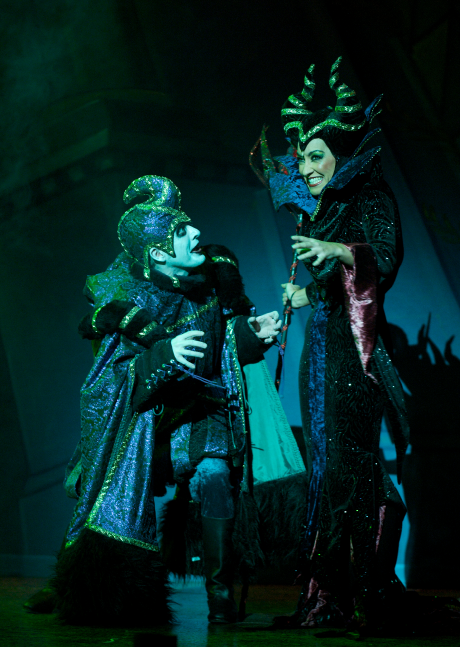
Birmingham Hippodrome
*****
PANTO is all about goodies and baddies and you would have to go a long way to beat the baddies on display in Sleeping Beauty.
There are snakes, spiders, ghouls, man eating ducks with tusks, things that I have no idea what they were except they were horrible and all of them attacked each member of the audience individually. Kids, and quite a few adults, were terrified – and they loved it.
The real stars of what is otherwise a traditional panto are the 3D effects produced by Amazing Interactives, with a sequence in each half.
Forget the old cinema 3D with red and green cardboard specs, this is in your face, literally, fully fleshed 3D you can almost touch and it is worth seeing the show just for that alone. I defy anyone not to be impressed.
TRADITIONAL PANTO
Not that that is all there is to commend Sleeping Beauty which has all the parts needed for traditional panto and they are fitted together with considerable slickness and skill.
First up is the baddy, Carabosse, all green wickedness, exuding evil in the hands of Ria Jones pictured right with Slimeball). The only problem is that you would forgive the old witch anything as soon as she sings – what a voice!
She is lumbered with her sycophantic son Slimeball (Alex Woodhall) who
manages to be more of a hindrance rather than a help as a sort of cross
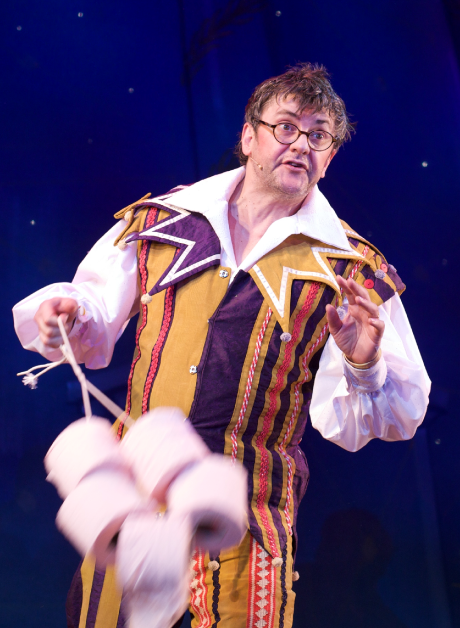 between
Richard III and Gollum. He is also the butt of what appears to be a
running joke about hunchbacks except the punchline, if there ever was
one, seems to have been lost somewhere along the way.
between
Richard III and Gollum. He is also the butt of what appears to be a
running joke about hunchbacks except the punchline, if there ever was
one, seems to have been lost somewhere along the way.
Then there are the goodies, pretty Princess Beauty (Lucy Evans in fine voice) and the Prince (Ray Quinn). The X-Factor runner-up seemed to be enjoying himself.
He seemed most at ease though with his one big band number but to be honest, from the pre-pubescent screams whenever he appeared, he could have sat at the side of the stage and read the paper all night and half the audience would have been happy.
SPINNING WHEEL CURSE
Batting for the goodies are the Princess's rather bumbling parents King Clarence (James Paterson) and Queen Gertrude (Kate Dyson) who have managed to keep their daughter safe from Carabosse's curse until her 21st birthday party.
The curse being that if she pricks her finger on a spinning wheel before she is 21 she will die, which of course, at the last minute, she does, otherwise it would all have been a bit of a wasted evening. Living happily ever before does not have quite the same ring.
Luckily the good fairy, The Enchantress, (Lucinda Shaw) tones the old curse down so the Princess instead of dying merely sleeps for a hundred years - which, to be fair, is about normal for 20-year-olds. So it is up to our heroes Lady Passionella (Ceri Dupree) and Muddles (Joe Pasquale) to rescue the prince and save the day, or at least the Princess.
Dupree has taken over the mantle of Danny La Rue as the most glamorous
dame on the planet, mixing in over the top costumes with impressions of
Amy Winehouse, Shirley Bassey (pictured below),
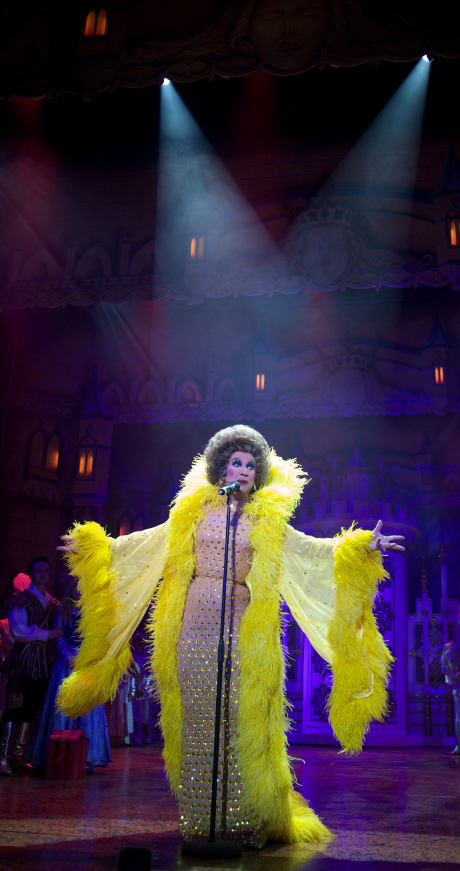 Tina
Turner and even Camilla Parker Bowles. It makes a welcome change from
the “I've got a little behind” school of panto dames.
Tina
Turner and even Camilla Parker Bowles. It makes a welcome change from
the “I've got a little behind” school of panto dames.
Joe Pasquale (seen above with the five toilet rolls of Christmas . . . don't ask) was probably born for panto. His whole act has been about working an audience with silly and at times remarkably clever jokes and nowhere is that more essential than in panto. His timing is superb with not one punch-line lost and at the end he turns what is little more than a filler to give time for scene and costume changes for the grand finale into one of the show's comedy highlights.
The variation on the 12 days of Christmas with Lady Passionella, the King and Slimeball, quickly descends into items being hidden, toilet rolls thrown into the audience, Slimeball chasing around the stalls to retrieve props and general chaos.
Joe does look a little worried at one point though. It comes at the end of Act One when he flies from the stage above the audience in the stalls and then above the circle, waving and smiling grimly as he goes and no doubt mentally calculating the breaking strain of wire and the effectiveness of Rawlplugs until he vanishes safely into a hole in the roof.
HARD HATS
Nothing to do with this show but one national panto company wanted to fly a character over the audience in a theatre on the south coast only to be told by 'elf 'n' safety that a ten seat wide swathe of audience under the wire would all have to don hard hats for the performance . . .
These days with lighting-up wands, sabres, and the like on sale in every theatre foyer you can gauge how successful a panto is by the brightness effect. The more red and blue lights you can see flashing among the audience - the more bored the kids.
Songs, particularly romantic ones, and any serious conversation to advance the plot tend to have the audience rivalling Blackpool illuminations but apart from that Sleeping Beauty managed to get by mainly in darkness. And you can't get better than that.
The audience booed when required, cheered and shouted as tradition dictates and went home happy – if a little wary of snakes and things that go bump in the night. This is the Hippo's 52nd panto and once more keeps the tradition well and truly alive. To 31-01-10
Roger Clarke
VIDEOS, PODCASTS and more IMAGES
Bride or
groom?
What a reception
Ringside
Birmingham Town Hall
MEM Morrison's performance in this joint Birmingham
Rep production is a little like sifting through a box of old postcards
at an antiques fair or turning the tuning dial on an ancient radio and
hearing snatches of strange voices breaking through the static and
whistles that fill the airwaves. Voices and sounds from foreign lands,
pictures of
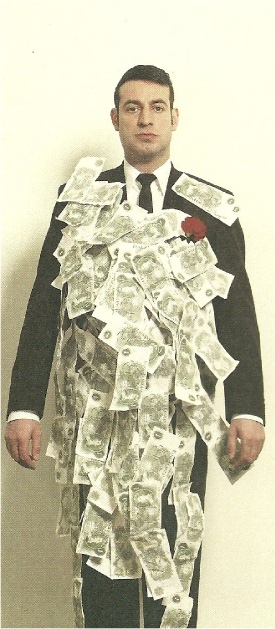 another world. You become a voyeur looking a memories and hearing sounds
from someone else's life, coming in snatches and snapshots.
another world. You become a voyeur looking a memories and hearing sounds
from someone else's life, coming in snatches and snapshots.
In Ringside there are parts you recognise from any
wedding, the video camera sequence for example, as well as parts that
are alien and parts that are beyond comprehension unless you live in the
mind of Mem who runs around the vast space of the Town Hall at times
like a Turkish Mr Bean.
A play it isn't, it is more of a . . . happening. The audience arrive to be greeted by 16 attractive ladies dressed for a wedding who are ushers, waitresses, guides, brides and memories.
We are no longer audience we are guests, and we have the photographs to prove it! Look on www.memmorrison.com/ringside and eventually the Town Hall pictures will appear along with the weddings in London and Edinburgh. Group after group attending someone else's life.
Having been photographed and told who we are, bride,
groom, mother with cystitis and so on we are seated on long tables
around three sides of the vast emptiness of the Town Hall for the
reception, complete with name cards, crisp white tablecloths and, to
show we are observers rather than participants, headsets.
All the elements are there, cleverly constructed in
cardboard boxes with plates, glasses, wine and even gifts as
flashes of Mem's life at a succession of weddings in his Turkish Cypriot
family pass by. There is even a seven tier wedding cake, multi-layered
rather like the performance.
As with any wedding we have the album, except this
is photographs of Mem's appearance at weddings since 1974.
There are the dances, the symbolism, 16 brides and
finally a groom, or is it a bride, it is certainly Mem, wrapped in a
table cloth, covered in pinned on money, chanting “It's your turn next”.
It is a piece of performing art with humour, some
clever touches and bits I admit I never quite understood but I am
neither Turkish Cypriot nor Mem but the evening did pass the watch test.
Look at your watch after any piece has been running
for what appears to be a reasonable time. If the time is much
later than you expected then you are enjoying an absorbing performance.
If the watch has hardly moved then paint drying on the scenery might
well have been the highlight thus far.
With Ringside the hour and a half fairly flew by.
www.birmingham-rep.co.uk 0121 236 4455
Pluck lose their way among the icebergs
Pluck - The Titanic Show
Lichfield Garrick
PLUCK'S first show, Musical Arson, was an Edinburgh festival
sell-out and was hilarious. It was musical mayhem ending with Hendrix
played on cello, viola and violin - as no doubt Jimmy had intended all
along.
Their second show, The Specialists, was a little more
sophisticated but still very funny with the same blend of ridiculous
situations, such as carrying a chair with one foot, hopping on the other
and playing a viola all at the same time.
Now we have their third coming, TheTitanic Show, which sadly is a
little like its subject. It struggles to stay afloat and doesn't really
reach its destination.
The theme is supposedly a tribute to the band on the ill fated
liner but the result is a collection of unconnected musical sketches
which are amusing but fail to raise the belly laughs of the past.
It perhaps does not help that founder Adrain Garratt, the manic,
petulant, pop-eyed violinist has left for pastures new and cellist Sian
Kadifachi is taking time off to have a baby which leaves viola player
Jon Regan as the only original member with newcomers Flora Alison
(cello) and Kit Massey (violin) still feeling their way. Whatever
it was the whole evening lacked pace with some of the gaps between
scenes far too long.
The upper class accents are amusing for a while, the musical skill
is still there with everything from Bach, a nicely played Prelude from
Cello Suit No 1 from Alison, to Leroy Anderson's Typewriter but
the real silliness and mayhem is missing as is the Pluck hallmark of the
three musicians trying to outwit, outdo and outplay each other.
It appeared at one point that a serious rendering of Nearer
My God to Thee might have produced a rather touching, moving - and
unexpected - end as the stage was left empty and in darkness leaving the
audience in a rather sombre mood reflecting on what was, we should
remember at the end of the day, a human tragedy.
But the audeince could not reflect too long because on came a
rather crass sequence of the band playing on the bottom of the sea
followed by the trio being washed up on a palm tree bedecked shore to
produce, bizarrely, a Morris dancing finale to Mike Oldfield's
Portsmouth.
The madness, spontaneity, anarchy and plain old daftness have
gone. For a newcomer it was probably an amusing evening but for Pluck
fans it is a titanic disappointment.
Roger Clarke
IT IS a bit of a toss-up whether the REP has the first Christmas show of 2010 or the last of 2009 – not that the small children gazing in amazement at a flying snowman and a boy will mind.
To them, and, let's be honest, to those to whom childhood is a more of a memory test, The Snowman has established itself as a festive classic.
It is a magical piece of theatre with a score by Howard Blake and a song for which the word haunting might well have been coined. Since 1993 when the stage production first appeared at the REP it has become a traditional Christmas show in London, having just completed its 12th season, has played to sell out houses in South Korea and is back once again in its birthplace.
American actor Brad Madison arrived from playing the Snowman at The
Peacock in London to carry on the role in Birmingham and manages with
shrugs, a tilt of the head here and there and lolloping arms and legs to
convey an amazing range of emotions. Not an easy feat while encased in a
stifling suit – which must be akin to a sauna – with no chance of facial
expressions or even eyes to give a clue.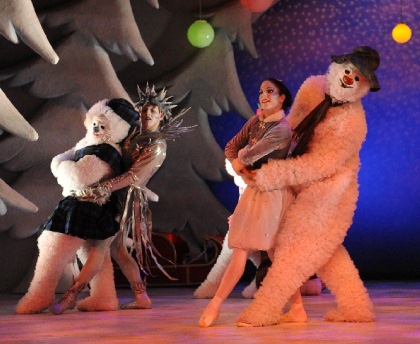
For anyone who has been off the planet for the past 20 years or so the Snowman tells the tale of a 12-year-old boy who wakes up to find it has snowed so builds a snowman.
After going to bed he sneaks downstairs again to see if his snowman is still there and finds him not only still standing but alive and ready to take the boy off on a series of amazing adventure which sees the pair eventually flying to the Pole.
Bit of a problem here as Santa is there and as we all know Santa lives at the North Pole but we also have penguins and you only find them at the South Pole – all right, I know, I really should get out more.
FUN AND ENTHUSIASM
Meanwhile the boy, played in this performance with plenty of fun and enthusiasm by James Wilson, returns home to bed and come morning the snowman's worst nightmare, a thaw, has left our frozen hero as a puddle - big ahhhhhh for the Snowman.
But before we can feel too sorry for the show's liquidated asset it starts to snow again and as the boy excitedly dances around in a new blizzard we just know that once the audience has cleared off he is going to build the snowman once again for another night of adventures.
The story is easy to follow in mime in what is a piece of dance, a children's ballet. Between building the snowman and seeing him melt we have dances with a slinky cat, a ballerina, pineapple, banana and a shimmying coconut. There are squirrels, badgers, reindeers and a whole host of snowmen from Chinese to Fred Astaire, cowboy to a Highland lassie with a nice line in a Glasgow kiss as well as Father Christmas and the penguins. More ballet is added with an Ice Princess and Jack Frost.
It all ends with a blizzard and the look of open-eyed wonder of virtually every child's face as they left means another generation have been hooked. This is family entertainment at its best. It runs until 31-01-10
www.birmingham-rep.co.uk 0121 236 4455
Scottish play hooks the kidz
Shakespeare4Kidz
Grand Theatre, Wolverhampton
* * * *
WHAT a treat to see young children packing a theatre and lapping up one of the Bard's classics, albeit given a few new twists by this hugely talented company.
The musical adaptation is just about the perfect recipe for youngsters, with a few scary moments, including murder, intrigue, some catchy songs, slick dancing, a realistic sword fight and a touch of naughty humour to keep them glued to the action.
Pupils aged between eight and 16 years, drawn from 49 schools - 36 primary and 13 secondary - loved every minute of the drama, spontaneously joining in with rhythmic clapping during the cracking finale.
There were shy giggles at the first kiss between Macbeth and his lady and at references to a baby being breast fed, then howls of laughter when Noel Andrew Harron took the stage as a cheeky porter at the Macbeths' castle, attracting loads of audience participation with a game of Knock-Knock, Who's There.
The dramatic scenes were well handled, with outstanding performances from Jason Lee Scott (Macbeth) and Claire Marlowe (Lady Macbeth).
But without doubt it is the musical additions to this play that prove the most important lesson for the fascinated young audiences. Four performances were given at the Grand.
Paul
Marston
Trollope lives again in Fox
Edward Fox - an
evening with Anthony Trollope
Lichfield Garrick
****
EDWARD Fox exudes class and in this one man show he is an
eloquent, elegant, urbane Trollope, one of the giants of English
Victorian literature.
The one time GPO surveyor's reputation dipped a little after his
death with the publication of his autobiography.
The critics among the Victorian chattering classes were already
dismissive of his huge output - 47 novels and dozens of short stories -
as if quantity and quality were mutually exclusive and when his
autobiography revealed he also had a set routine for writing a daily
quota and even admitted he wrote for money rather than art then he was
damned in their eyes, at least for a while.
But the public never deserted him and he was to become one of the
English language's best loved novelists. How Trollope spoke or acted we
will never know but in the hands of Mr Fox he certainly comes alive on
stage.
Devised and directed by Richard DIgby Day the production mixes
Trollope speaking from his Autobiography with readings from some of his
novels introducing characters such as The Warden Septimus Harding, Dr
Grantly, The Bishop and Mrs Proudie, and the Bishop's domestic chaplain
Mr Obadiah Slope along with Dr Thorne and finally Johnny Eames'
encounter with Lord de Guest and his bull.
It is a testament to Fox's skill as an actor that one man and a
chair could fill a stage for so long.
In the excerpts from the Autobiography Trollope spoke directly to
the audience explaining in part how he worked and what he though of his
novels and characters and his beloved county of Barsetshire.
The readings then took the audience into Trollope's world of the
Chronicles of Barsetshire through The Warden, Barchester Towers, Doctor
Thorne, Framley Parsonage, The Small House at Allington and The Last
Chronicle of Barset.
It was noticeable that in the first half Fox did not need
the aid of any script for the dramatised readings but as the second half
wore on he relied more and more on the words although with that measure
tone and elegant voice that hardly seemed to matter.
The Trollope fans in the audience loved it while it awakened an
interest in the writer among the rest.
Roger Clarke
 Classy
new look to a classic old tale
Classy
new look to a classic old tale
Snow White on Ice
Russian Ice Stars
Alexandra Theatre
CIRCUS, ballet, panto and even a touch of
Disney all combined as the Russian Ice Stars UK tour of Snow White on
Ice arrived, along with around 16 tons of ice, at the Alexandra Theatre
in Birmingham.
Snow White is an interesting choice, given that it
is a fairy tale long ago swallowed up by the Disney Empire and lovingly
spat out the other side in the form of a cartoon classic; indeed the
audience was covered with tiny versions of Uncle Walt's Snow White, with
replica costumes worn with barely concealed glee.
The Ice Stars wisely choose to give only a small nod
to the cartoon (pleasing the young audience enough to make it known that
they were watching the right production) instead focussing on the
narrative of the traditional fairytale, give or take the various
acrobatic set pieces crammed into the show for the sake of razzle dazzle
quotas.
Chief acrobats were Alexander and Ekaterina
Belokopytov as the strongman and jester, both graduates of the Moscow
Circus College, who managed to bring the feeling of the Circus big
top to the compact stage - all that was missing was a pony, some custard
pies and the clowns.

They injected a real fear factor into the
choreography, no mean feat given the size of the stage. Both,
incidentally, have toured with the Moscow Circus on Ice.
Of the show skaters themselves, top of the class were world and European pairs champion Valdis Mintals as Prince Charming and Irina Tkachuk as Snow White (who made a couple of dramatic saves, to stave off falls) - both pictured right - along with Alexei Kozlov as Toppa the crow who injecting a little panto spirit into the production.
Top marks go to choreographer Guiseppe Arena, who
manages to utilise the stage space fully without it appearing cramped.
The skaters are constantly moving, a dramatic necessity given the lack
of words and the ever present (and sometimes quite grating) musical
score from Silvio Amato.
With plodding, repetitive theme music, the evil
Queen Drina (seen above) , skated by Svetlana Kuprina, had a job on her
hands to make her baddie part bad enough. But to her credit, boos and
hisses were coming by the end.
The show, based on a Russian folk tale version,
sometimes got a little lost in translation but it was not difficult to
follow and everyone could piece together the blts of the story easily
enough.
Overall, don't go to this if you are expecting
Disney's Snow White on Ice but do go if you want to see a Russian
production that manages to put on a pretty good show, on a relatively
small rink.
Theo Clarke
Click on Snow White for
a clever illustrated book of the fairy tale at
http://www.wildroseltd.co.uk/productions.html#
THE television show Dancing on Ice will never seem the same after this truly spectacular skating fairy tale.
A cast of more than 20 world class medal winners give a breath-taking performance that has the audience gasping in awe at the sheer skill and daring of the remarkable Russians.
This is skating at a different level....at times some of the skaters even fly above stage on a wire in an amazing display of aerobatics that is a joy to watch.
The Russians are leading performers of world class ice skating in a theatre format, and they tell the timeless fairy tale to music, without a word spoken.
It's easy to follow the plot, which opens with the Wicked Queen drinking a potent mixture from a foaming cauldron which turns her from an old crone into a beauty, but according to the magic mirror, still not as beautiful as Snow White.
But her jealous plan to dispose of her rival is beaten with the
help of the seven dwarfs - one must be 6ft 4ins tall without his skates
- and finally the intervention of the handsome Prince Charming who ends
the show by skating with Snow White and spinning like a top, holding her
aloft on one arm. Incredible! These Russians are red hot.
Paul Marston
Alexandra Theatre, Birmingham
***
WHEN you go to see a stage adaptation of a hit television series it's inevitable that you will want to compare the main characters with the much loved stars of the small screen.
So people attending the matinee performance of Porridge probably felt some disappointment when they heard EastEnders actor Shaun Williamson, who has earned high praise for his performances as old lag Norman Stanley Fletcher, was out through illness.
But they needn't have worried. Mark Pearce took over the role with such confidence he would have impressed the late Ronnie Barker who played Fletch with such distinction on telly.
Pearce even resembles Barker, and he was totally comfortable with the sharp humour of the crafty inmate of Slade Prison.
The same could be said of Daniel West, playing Fletch's cellmate Godber, Nicholas Lumley (the canny Scottish prison officer, Mr MacKay), John Conroy (Barrowclough) and Peter Alexander (privileged prisoner Grout).
How does this show compare with Porridge on the box? Not quite as tasty, but good entertainment.
Paul Marston
A rock down memory lane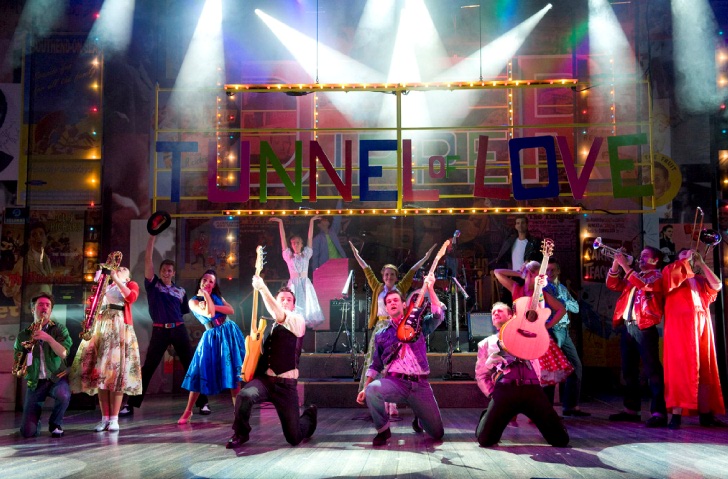
Dreamboats and Petticoats
Wolverhampton Grand
****
THIS is not so much a show as an animated jukebox, one of those Greatest 60s Albums EVER Since The Last One brought to life.
Not surprising really as the show evolved from a collection of compilation CDs of the same name and with 43 tracks - sorry songs - to fit in there is not lot of room left for dialogue or plot - but it is great fun.
The plot, such as it is, is as thin as Twiggy in her
heyday and revolves loosely around a song writing contest for youth
clubs, a fledgling group, a cocky, older, God's gift to women would be
pop star, and the nice honest lad and the nice honest girl who we know
will eventually get together amid the ping pong and Jubblies at St
Mugo's Church youth club somewhere in Essex.
In short it is a bit like the subject of many of the 60s songs, a teenage life in three minutes, but this is not about clever, witty writing, great drama or landmark theatre - it is about nostalgia, lost youth and memories.
Most of all it is about fun and having a good time and in that it served its purpose.
HISTORY LESSON
Many of the audience seemed old enough to remember when the songs such as In Dreams, Bobby's Girl, Runaway and the like first came out while I suspect to most of the cast it was more of a history lesson.
With so many songs the plot and character development were brought down to snapshots but the cast packed the show with enormous energy and produced some fine singing and musicianship.
There was no off-stage band or session
musicians here - the cast managed two keyboard players, seven
guitarists, a drummer and five brass between them to make all their own
music and all were good, particularly Alan Howell on lead guitar and Tim
Jackson on keyboards.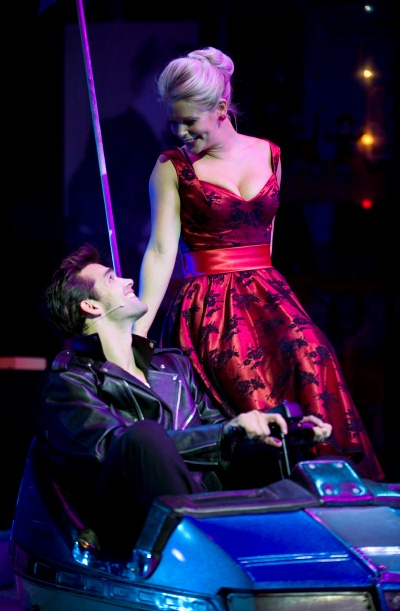
Remember that the next time you think X-Factor is the pinnacle of talent.
There were a few novelty moments. Josh Capper as the male hero Bobby had a very pleasant voice on most songs but when it came to Roy Orbison and those high notes . . . ah well.
Bobby was always going to end up with Laura, (Daniella Bowen who has a lovely voice) who we all knew, when the glasses came off, the hair came down and she lost the unflattering school uniform, was going to be a real stunner, and we were right. Didn't Bobby ever watch romantic comedies at the old fleapit cinema?
COCKY ROCKER
But it took auditions for a singer for the youth club band, a coach outing to Southend, Bobby's dalliance with the flighty and somewhat well developed Sue (Carolynne Good who had a superb voice that deserves more exposure) and the cocky rocker Norman (played with some panache by X-factor contestant Jonathan Bremner), seen left with Sue, before true love blooms in the big finale which, to make sure the audience went home happy and humming along, had Lets Twist Again, C'mon Everybody and At The Hop to get the audience up on their feet.
C'mon Everybody, incidentally, was sung by Laura's brother Ray who was played by Wayne Smith who was in fine voice all night and, it was announced, will soon be leaving the show to become Neil Sedaka in another Bill Kenwright production, Laughter in the Rain which will be at the Grand on March 23. This was not great theatre but it is high energy, well sung and performed, fast paced and most important - great fun. To 13-02-10.
Roger Clarke
Lake falls to power of swans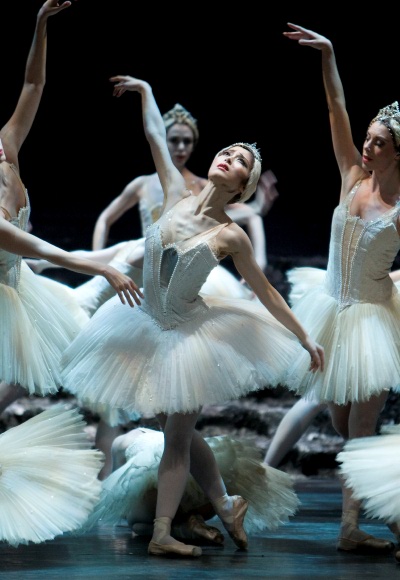
Matthew Bourne's Swan Lake
Birmingham Hippodrome
*****
THE problem with Matthew Bourne's Swan Lake is the name.
Not that it is much of a problem given the standing ovation, sustained applause and cheering at the end of the opening night of the swan's week-long roost at the Hippodrome.
But would West Side Story have received the same welcome and adulation had it been called Leonard Bernstein's Romeo and Juliet? Two productions both alike in dignity as one might say.
If you have never seen the traditional Swan Lake ballet and your knowledge of the music comes from a Tchaikovsky's greatest hits compilation CD then this is a stunning piece of modern dance.
But if you turn up thinking this will be a
performance little changed since the ballet's inauspicious premier in
1877, expecting a graceful, elegant and female corps de ballet, fluffy
swans in tutus, think again.
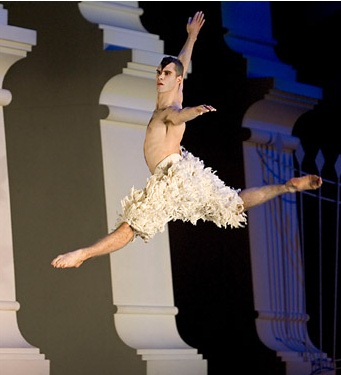
Swans on the park lake are hardly cuddly and neither are Matthew Bourne's nasty birds. En pointe has been replaced by power, aggressive, raw power. Bourne's all-male herd of swans no longer decorate the stage they dominate it.
WOODCUTTER AND GOBLINS
The tale too has been changed bringing in night clubs, paparazzi and even a very funny send up of traditional sentimental ballet involving a princess, a woodcutter and goblins.
Throughout it all though we have the Prince, danced and acted superbly by Dominic North who guides us on the slow descent into madness.
As a child the Prince had nightmares about swans and a need for love from his mother the Queen which never seemed to be there. He finds a sort of happiness with a girlfriend who is, let us be honest,closer to the Royle than the royal family - a beautifully crafted performance from Madelaine Brennan.
When that starts to flounder the prince heads off to Swanks, the Stringfellows of the kingdom where the dancing becomes closer to jazz and 70's disco than ballet.
Once again the Prince finds himself an outsider and when he sees the private secretary (Steve Kirkham) paying off his good-time girlfriend to vanish, the journey to the dark side accelerates.
Whether the swans he finds on the lake in the local park are real or a figment of his troubled imagination we will never know but this is the closest the prince has come to happiness and the closest we have come to the traditional story.
LEATHER PANTS AND SWAGGER
The link to the ballet continues when a stranger appears as a lewd, arrogant sex machine at a royal reception, all leather pants and swagger.
As in the traditional version when the white Odette and the black Odile are danced by the same ballerina, Richard Winsor takes on both roles. He was last at the Hippodrome in November as Dorian Gray and brings a sinister grace and power all of his own to the roles where the effort and energy needed must leave him a few pounds lighter after each performance.
As the Queen and the stranger become more than good friends the Prince snaps, draws a gun and in the melee the girlfriend is shot and the Prince's descent to insanity accelerates until when it is too late the queen finally expresses her feelings.
The Americans have not had a monarchy since they
discovered the benefits of tea but New Yorker Nina Goldman manages a
truly regal performance as the Queen as she glides
about the stage with an effortless elegance.
The stage too is worth a mention with another huge, magnificent set from Lez Brotherston who was also responsible for the costumes. Rick Fisher is also worth a mention. He was responsible for the lighting design which, as in this case, can add much to a production.
Clever lighting gave us everything from Victorian footlights for the comedy ballet scene to the creation of extra characters and atmosphere with towering shadows or solitary spots. It is a masterclass in lighting and theatre design.
Matthew Bourne is at pains to point out that this is not a ballet and he is right, it is a piece of magical theatre and contemporary dance and since it appeared in 1995 it has established itself as a modern classic to become part of the GCSE and A level syllabus.
Comparison with the traditional Tchaikovsky ballet is interesting but hardly necessary to appreciate a landmark production. It is not in competition with tradition or an alternative to ballet. This is a piece that stands firmly and squarely on its own feathered legs and probably more than anything is responsible for the growing interest in modern dance. See it and you will understand why. To 13-02-10.
Roger Clarke
Birmingham Hippodrome Box Office 0844 338 5000
Groups and schools 0844 338 7000
Carefree take on Whittington
Swan Theatre,
****
CHRIS Jaeger has written and directed a pantomime
that is happy, full of fun and movement, light on its feet and never
gives up on puns that the children don't understand and the occasional
saucy line that similarly travels harmlessly over the heads of a young
audience.
It is not Ben Humphrey's fault, but am always
disappointed when there is no traditional thigh-slapping girl in the
central role. A bit of flair and pezazz inevitably goes missing – but on
the other hand, in this instance, it would not have looked right if a
female Whittington was being walloped on the head with a broomstick. Mr
Humphrey was also unlucky at the matinée I attended, in that the small
boy whom he had led onto the stage burst into tears when it was his turn
to say who he was. Happily, our Dick Whittington rose above the
misfortune and was his usual heroic self.
Notzarina Reevers gives us a delightful
This is a Dick Whittington
that does not give Tommy the chance to see off Queen Rat – a bravura
performance by Liz Grand. Another surprise is that the Pirate King turns
out to be a kindly man underneath the anagram angst that has ensnared
him as Johann Sven Rittems, the alter ego
of John Martin-Stevens, who has earlier been busy as Alderman
Fitzwarren.
Richard Curnow leads the laughter pleasingly as
Sarah the Cook in what is his fourth successive pantomime as the Swan's
Dame, and Graeme Brookes emerges prominently in the second half as the
lugubrious Mate Mussels.
This is a splendidly carefree pantomime with lots of
highly-populated dance routines powered by musical director Rick
Godsall, an amusing underwater scene that ends with a clever
transformation involving weeds and mermaids, and a notably cavalier
approach to that fusty old tradition that would have Queen Rat and her
Ratlings making their exits stage-left instead of where it's most
convenient.
To 3.1.10
John Slim
OAPs, porn films and star
knickers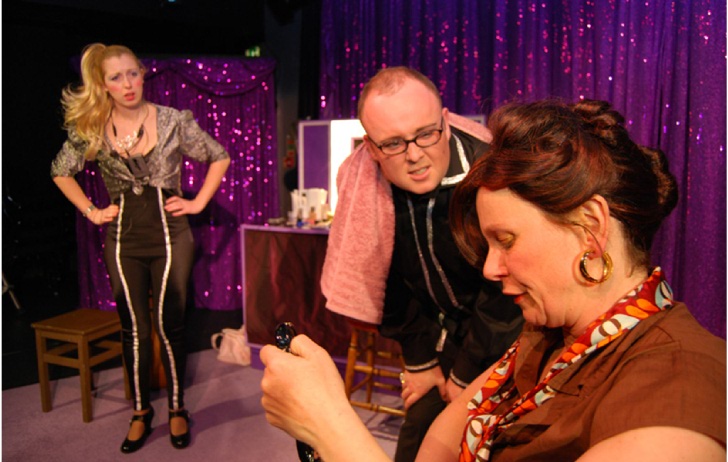
Dressing room drama: Patrick (Dan Hagley) talks to Reen ( Alison Belbin) as Bernadine (Eleanor Jones) looks on.
Patrick and Bernadine (turkey and tinsel edition)
The Old Joint Stock, Birmingham
****
HE worked in a video store while she stacked shelves at the local Superdrug but put them together and they were Patrick and Bernadine taking the entertainment world– or at least North Wales out of season – by storm with their tacky cabaret act.
But their super star life among the bingo, Cherry-Bs
and pensioners is set to change when Bernadine gets a letter from the
BBC to say she has made it to the next round of their pop talent show
and decides she has to go, she has to grab her chance.
Poor old Patrick, prematurely bald and appearing in a ginger wig – ginger if all colours - is left as one half of a not very good double act fulfilling the season's fixtures like an already relegated football team.
Throw in Bernadine's over-sexed mum Reen and a kleptomaniac aunt and Patrick could be excused for topping himself before we reach halfway in this very funny play by Birmingham writer and actor Dan Hagley, who plays Patrick.
FUNNY LINES
There are some deliciously funny lines and - the mark of good writing - situations the audience can relate to. The three are characters we have all met such as soon to be 50 Reen, played with a confident comic touch by Alison Belbin. If there was a flaw it came in the scene when she was introducing her half century birthday party when her constant moving about the stage is a distraction which, I add quickly, is an observation rather than a criticism of a fine, blousy performance which is all brash and boobs.
Eleanor Jones brings a hint of comic pathos to Bernadine, the wannabe star who is tired of the life of tatty digs, tattier clubs and indifferent audiences, all for less than minimum wage.
So she tries plays the instant fame game generated by the procession of shows such as X-Factor and Britain's Got Talent. An accident involving knickers makes her an instant TV hit with all the trappings that go with celebrity as the finalists show runs the gauntlet of screams at the NIA, Wembley, MEN Arena.
But as everyone more in touch with reality than celebrity knows instant fame brings in its wake instant forget – anyone remember who came third in the first X factor? Or won the second? It is a great source for pub quiz questions.
WELL WRITTEN
As Bernadine's 15-minutes of fame ends both she and Patrick and Bernadine find what they were looking for might have been there all along.
It is a well written and well acted piece with a cleverly crafted mix of comedy, drama and pathos directed with a light touch by Lorna Laidlaw.
There are many nice touches such as the obviously gay Patrick preferring the black sparkly shirt because the cerise one makes him look . . . gay and Bernadine's fame being down more to a slip than her singing.
But that sums up many of the TV talent shows. People happily watch them because acts are served up, with suitably inspiring stories, at the end of the remote control but make the effort and go out and look for it and you will find there is plenty of real talent for you to discover – such as Patrick and Bernadine.
To 12-12-09 then 16-12-09 to 19-12-19.
Roger Clarke
Answers for the anoraks among you
a) Tabby Callaghan b)Shayne Ward – and no, I didn't know. I had to look them up.
http://www.patrickandbernadine.co.uk/

Lichfield Garrick
****
PANTOMINE is a distinctly English institution which has been part of the Christmas festivities for almost for two centuries – some of the jokes I suspect date back even earlier- and the Garrick is building quite a reputation for its traditional pantos.
Lichfield does not have the glitz or gloss of some of the bigger name
pantos but it does have a homely feel and bags of charm – and can be
enjoyed by toddlers and maiden aunts alike.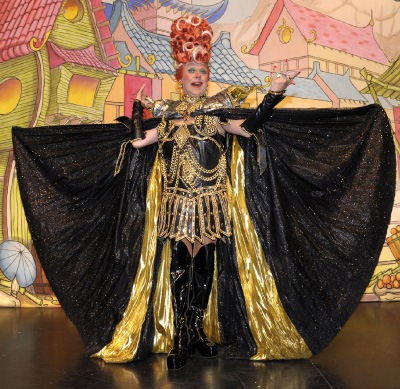
The story of Aladdin stems from The Book of One Thousands and One Nights and apart from a setting in Peking rather than the Middle East the plot of this version sticks fairly closely to the Arabian Nights original, not that plot is usually a major factor in panto where happy endings are compulsory.
We all know that Aladdin (Paul Martin-McDowell) and Princess Balroubadour (Rachel Matthews) are going to live happily ever after - the fun is all about how they get there.
And much of that comes from comedian Barnaby, back again for his third Garrick Panto, who has an easy relationship with audiences and particularly children –even when a small child wandered up on to the stage.
LUCKY BAGS
She had seen a group of four selected children go on stage for a chat with Barnaby and a song. They left with lucky bags so, with the steps invitingly close, she decided she fancied a bit of that so wandered up on to the stage for her presents . . .
Foil for Barnaby's Wishee Washee was the writer and director of the Panto, Ian Adams, (seen right in a gown worn by Danny La Rue) who delights as a traditional dame with a fresh frock for virtually every sentence.
Baddy of the piece is Tom Roberts, the producer of the Garrick Rep, who
does a nice line as Abanazar. He manages a tongue in cheek performance
as a sort of Basil Fawlty baddie, a mix of likeable and despicable
although not everyone saw him in quite such as benevolent light.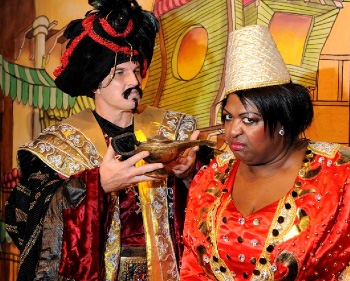
He is the first character on stage and as soon as Abanazar walked out, without even speaking, a child at the back started crying very loudly screaming in terror and anguish over and over again “I don't like him”. Nice one, Tom.
Amid all that arrives Rustie Lee (Seen left with Tom Roberts as Abanazar) as the Genie and she brings not only a larger than life personality but chaos with her freeestyle interpretation of the script. You suspect that every scene with Rustie is a journey into the unknown for the rest of the cast – with Barnaby delighting in putting her off as much as he can.
A TOUCH OF SATIRE
You can guarantee that every performance will be different - and great fun. This is traditional panto, corny, silly, a little saucy, and sometimes hilariously funny.
It also has a touch of satire – at one point a character in a Gordon Brown mask appears and, as a sort of instant opinion poll, managed the loudest and most convincing boos of the night.
As I have said in other reviews, Christmas shows are often the first time children will visit a theatre.
Tom Roberts, first on remember, notices that expectant hush each performance as the house lights dim and stage lights come up and wide eyed children get set to experience the wonder of theatre. “That is what it is all about”, he said. And there is enough in this show to bring children back again. To 09-01-10
Roger Clarke
Birmingham Royal Ballet
Birmingham Hippodrome
*****
PRODUCTIONS in the Christmas season bear a heavy responsibility.
They are often host to the first visit of a child to a theatre, or a
youngster's Christmas treat so if a world of magic, wonder and
enchantment is opened up to young eyes and imagination is stirred then a
recruit is signed for life.
The Nutcracker, Birmingham Royal Ballet's thank you to Birmingham
when it first arrived in 1990, must have signed up an army by now and
really is a Christmas treat for young and old. It is fun, magical,
beautifully danced and old Tchaikovsky really did know how to knock out
a tune.
Sir Peter Wright's choreography, added to by Lev Ivanov and
Vincent Redmon, is full of tiny detail such as Clara's younger brother
Fritz being a pain with his young mates in the background at the opening
party leading to the broken Nutcracker doll.
Clara , beautifully danced by French ballerina Laëtita Lo Sardo,
is believable as the 15-year-old ballet student who takes us on a
journey through toys, soldiers and rats.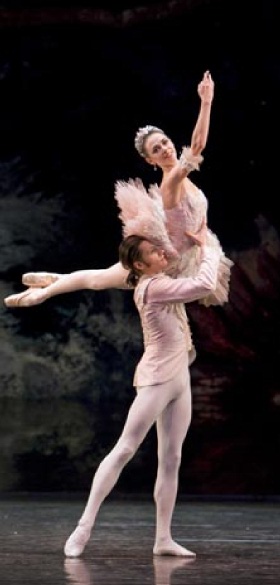
The scenery is magnificent all in sets rather like those you find in expensive Victorian and Georgian model theatres – the real posh jobs - while the effects still have a wow factor from the Christmas tree which grows to the size of the Post Office tower to a giant fireplace full of flames and smoke. Act II opens with a huge huge flying goose in the moonlight and amid all that we also had lava flows of dry ice and a snow storm - all it needed was a few falling leaves and the Toytown rail service would have been closed for the duration.
James Grundy as Drosselmeyer, the magician, was suitably
mysterious and imperious in his flowing cape of sumptuous colours full
of simple tricks well executed - and he could hardly be blamed for the
radio controlled rat crash which all added to the fun of the
proceedings.
Once Clara had found herself in Toyland and the rats had been
defeated the toys could relax and go through their paces with a mixture
of charm and skill with special mention for the Rose Fairy, the Japanese
ballerina Momoko Hirata on the Waltz of the Flowers as well as Matthew
Lawrence as the Prince and Gaylene Cummerfield as the Sugar Plum Fairy
who filled the stage with quality.
There was one dodgy moment when one of the excellent Arabian dancers stumbled at the end.
It could not have been at a worse time as Andrea Tredinnick launched herself into the onknown to be, hopefully, caught by all three male dances and it was touch and go whether No 3 would be in position in time.He was, so she was and it all ended happily.
Behind it all was Tchaikovsky's much loved score played
faultlessly by the Royal Ballet Sinfonia under conductor Philip Ellis.
Billy Elliot was a successful film about a miner's son who wanted
to be a ballet dancer which has been turned into a smash hit musical. I
suspect that the majority who have seen it have never seen a ballet.
Watch BRB's The Nutcracker and maybe you will start to understand
Billy's passion. And for those youngsters on a first visit? They
have been handed the keys to a lifelong love of theatre.
Roger Clarke
Take That raining on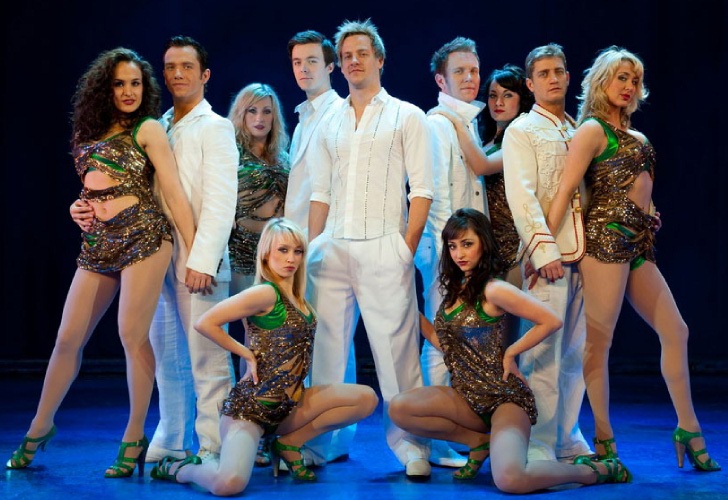
Taking That: Scott Garnham (Jose), Tom Bradley (Adrian),Mark Willshire (Ash), Adam C Booth (Jake and Philip Oliver (Dirty Harry) take stock of the dancers
Never Forget
Wolverhampton Grand
****
WHEN even the raindrops get a round of applause you know you are in the middle of a feel good show and Never Forget is just that – or rather is Take That - in a high octane, all action, singing and dancing jukebox musical.
On a stage looking like a jukebox, Never Forget takes the songs of the 90s Manchester boy band and weaves them into a story which involves a pub threatened by bailiffs, auditions for a Take That tribute band, a dodgy manager and even dodgier record moguless - or whatever a female mogul is called.
It is about friendships, mates, love . . . oh and don't forget the raindrops.
This is Take That's Mamma Mia all helped by a six piece band who did not miss a beat all night. There are a couple of tracks that were only Take That covers, such as Barry Manilow's fine Could it be Magic, among the 17 musical numbers which incorporate some lively dance routines and a couple of big production numbers including the downpour when the largest theatrical rain curtain so far drenches the stage and the dancers – neatly creating voids as the stars come through though.
SPONTANEOUS APPLAUSE
When the computer controlled drops spell out Never Forget in huge letters the audience burst into spontaneous applause. That was class . . . I should get out more.
The set design, by Morgan Large, deserves a mention
with swivelling panels and sliding walls keeping the action moving with
seamless scene changes which all helps to inject pace into any
production.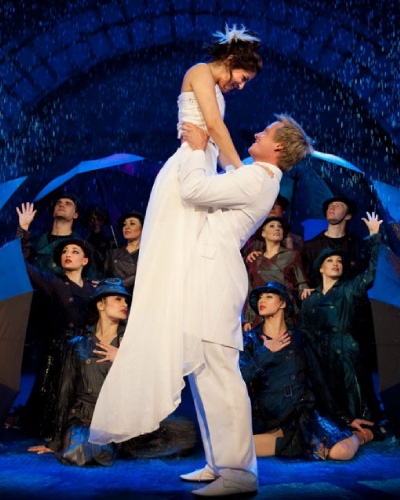
This is a show about a band though and the music. Mark Willshire turned some of the higher notes into a bit of an adventure as Ash, the tribute band's main singer who was forced into making real decisions about friendships, relationships and his future but he made Ash believable and looked and sounded like a pop star.
COMEDY CLASSIC
As a foil the rest of the boy band, the outwardly cocky Jake, (Adam C Booth), nerdy Adrian (Tom Bradley), non-too-bright Dirty Harry (Philip Oliver) and Spanish mummy's boy Jose (Scott Garnham) not only provided good vocal backing but plenty of laughs – their first performance is a comedy classic.
Aimie Atkinson as Chloe (Seen left with Mark Willshire as Ash) adds the love interest and a fine voice, particularly on Love Ain't Here Any More while Babs (Penelope Woodman) Ash's mum with the failing pub, tries to keep her son on the right track among the shark infested waters of pop stardom.
The sharks include small time manager/agent Ron Freeman (Teddy Kempner) and hard as nails music executive Annie Borrowman (Kay Murphy) who shows a fine pair of dancing pins but as in all feel good musicals it all comes right in the end.
The packed first night gave a deserved standing ovation which then turned into a ten minute party with a medley of Take That hits before people headed off to the car parks with a smile after a show they will probably never forget. To 28-11-09
Roger Clarke
Verdi's classic needs spark of romance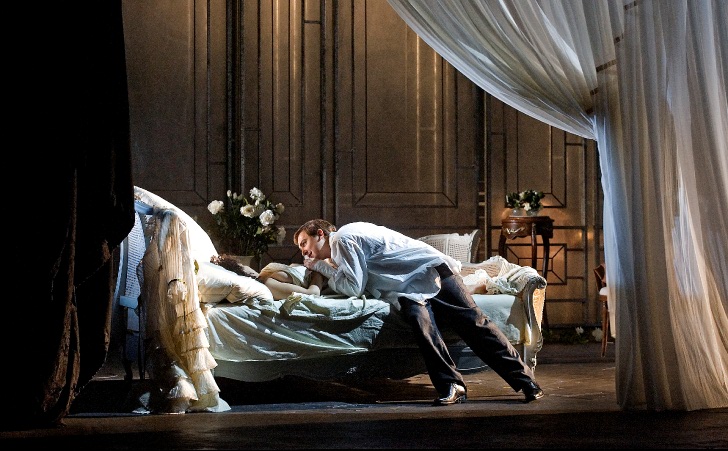
Ill fated lovers: Violetta, Katia Pellegrino, and Alfredo, Alfie Boe in Welsh National Opera's La Traviata
Welsh National Opera
Birmingham Hippodrome
****
FOR a woman with terminal consumption Italian soprano Katia Pellegrino displays a fine pair of lungs and a wonderful voice as Verdi's ill-fated courtesan Violetta.
She shows remarkable control and manages high registers, soft sustains and difficult vocal gymnastics with clarity and consummate ease in David McVicar's Welsh National Opera Production.
Alfie Boe, as her lover Alfredo, gives us an excellent vocal performance but for all the excellent singing their relationship could do with a bit more passion and fervour – a touch of theatrical Viagra would not go amiss.
The emotion the pair manages to generate as Violetta breathes her last is moving enough but if we had seen some spark of passion, some sexual chemistry earlier when the prostitute falls for her young lover the death bed sorrow would have had even more effect. It is all beautifully sung but a little genteel for a story which outraged and shocked 19th century society.
Uruguayan baritone Dario Solari as Alfredo's father Giorgio produces a suitably pompous performance showing clear tone and fine range as his meddling and interference set up the fate of our two lovers.
WONDERFULLY LAVISH
The story develops on wonderfully lavish sets designed by Tanya McCallin in predominantly black and white from the funereal opening to the dramatic end which is set like an Old Master's painting – Death of a courtesan in the arms of her lover by van whoever – as Violetta tells her Alfredo “I'm coming back to life!” Ah well, some you win and some you lose, love.
Clever use of black drapes, which at times are even choreographed, allows seamless scene changes with no pause in action and the furniture gives an immediate impression of opulent 19th century Paris until we reach the drab trappings around death.
The predominant black gives an air of menace and mourning but that is lifted by light, airy apartments in Act 2 when our lovers still believe they have a future together.
Clever direction brings the party scenes, and the gypsy and matador dances to life. Only those who have done it know how difficult it is to create a tableau, a moving picture of a party, rather than just have a load of men and women in posh clothes cluttering up the stage and McVicar paints his pictures well. The two party scenes are excellent.
And despite that lack of sexual chemistry between his lovers McVicar does manage to introduce each of the main characters to the audience and give them some believable purpose in being there.
My reservations are minor and there is much to commend what is in the main a fine performance from both singers and orchestra conducted by Andrew Greenwood. La Traviata is performed again on 20-11-09.
Roger Clarke
First Light promises a fine dawn
First Light Theatre
Old Joint Stock
CHARLES Lebanon Fairbanks Jnr dreamed of space travel, Fireball
XL5, and, was buying ingredients for his mother for a Christmas ham the
day JFK died.
Just some of the minutia of ordinary life to surface in Radio, Al
Smith's one man play about relationships, space and, of course radio
which he wrote as a one-off project for the Edinburgh fringe in 2006.
That was expected to be the end of it but the play took on a life
of its own and went off on its own journey with performances in the USA,
Australia and now . . . Birmingham.
New West Midlands company First Light decided on the play as their
first venture which was both a brave and a sensible decision. Sensible
in the fact it requires just one actor with a set comprising of just one
box; brave in that it is just one actor with a box.
The actor, Robert Madeley, asked the director Lucy Poulson to
direct him in the play two years ago and finally Radio has been switched
on with Madeley at last taking on the challenge of Charlie – and
winning.
For an hour he commands the stage to chronicle the life of his
family from the settlers who founded Lebanon, Kansas - which a survey in
1898 found to be the centre of the contiguous United States - to his
father, a farmer tuned entrepreneurial flag seller and finally of his
own brief life woven around events in the USA of the 50s and 60s.
Radio is not so much a play as a long monologue and to hold the
stage alone for an hour and keep an audience interested during that time
is no mean feat but Madeley not only managed that but never dropped his
accent once even when adding the voices of characters such as his father
and mother.
What it is all about is up to the listener. There is love in there
as well as hurting people and chasing dreams, and we all have dreams.
Behind it all Radio has its own say on war, the USA's own bête noire
Vietnam.
Madeley gave a compelling performance and if there was a flaw it
was in the script where occasional phrases betrayed the author was
English rather than American while Gerry Anderson's 1962 TV series
Fireball XL5 was never an American radio series – although it did make
it to NBC's Saturday morning children's TV in 1963.
Picky I know but authenticity relies on such things. For First
Light though Radio's dials shone brightly enough for a promising dawn.
Roger Clarke
Birmingham
Royal Ballet
Birmingham Hippodrome
*****
JUST imagine you could attend only one
theatre event in a year! In that unlikely situation, I know many people
would choose Sir Peter Wright's production of The Nutcracker.
And why not. It delivers an annual dose of
magic just before Christmas, with sublime dancing, fantastic sets,
spectacular costumes and Tchaikovsky's glorious music.
Having mentioned magic, it has to be said
that on opening night the only tiny hiccup came when Robert Parker,
playing the remarkable magician, Drosselmeyer, brandished his
outstretched hands to repair, from distance, Clara's nutcracker doll,
spitefully broken by her jealous younger brother, Fritz (Jack Milburn).
Drosselmeyer has been performing the
'surgery' for the past 19 years, but this time the head failed to glide
gently back on to the body, so he was forced to snatch the doll from the
stage floor and make a manual repair!
That apart, the ballet is a sumptuous
spectacle in which 15-year-old dance student, Clara, comes downstairs at
midnight on Christmas Eve to find herself caught up in an amazing dream
situation in which the huge living room is transformed, with the
Christmas tree growing to an enormous size and the fireplace expanding
to release giant rats who battle with toy soldiers.
Carol-Anne Millar is a delight as Clara,
transported by Drosselmeyer to a fantastic world where she joins in with
dancers from many parts of the globe and becomes the Sugar Plum Fairy,
partnering the handsome Prince.
Chi Cao (the Prince) and Nao Sakuma, the
Sugar Plum Fairy, dance superbly, thoroughly deserving the tremendous
ovation they receive at the finale.
The Nutcracker, with Barry Wordsworth
conducting the Royal Ballet Sinfonia, runs to 13.12.09. You can't afford
to miss it.
Paul Marston
Annie just the remedy to lift
the spirits
Annie
Alexandra Theatre, Birmingham
* * * *
NOW here's a heart-warming musical that might well offer some encouragement to Gordon Brown in his fight against the recession if the beleaguered Prime Minister could find time to pop into the Alex!
Set in New York during the dark days of the 1930s big depression, it tells the story of little orphan Annie, whose single-minded optimism that she will eventually find the parents who abandoned her, becomes an inspiration to a nation.
Thousands were losing their cash, their
homes and their jobs, but President Franklin D. Roosevelt
led the fight back, and in this tale the man in the White
House and his advisors get a boost from the 11-year-old
redhead when she sings 'The Sun Will Come Out Tomorrow'.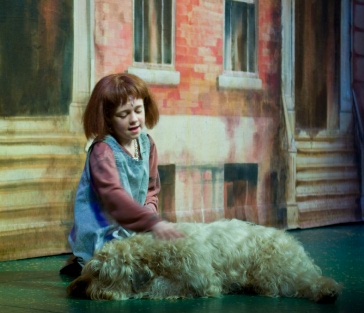
Little Lydia Tunstall, who shares the role of Annie with Grace Glevey, is a real star with a high-pitched voice and bags of energy as she copes with the hardship of a dingy New York orphanage before being invited to spend Christmas with billionaire industrialist Oliver Warbucks.
Along the way - wearing a somewhat strange wig - she 'adopts' a stray dog, Sandy, played with scene-stealing skill by former Crufts prize-winner, Danny, and when you put a child and a cute animal on the same stage, the audience are captivated.
AUDIENCE CAPTIVATED
Soap and West End star David McAlister is a powerful Warbucks, a strong character with a voice to match, while the loveable Su Pollard revels in the role of the drunken orphanage boss, Miss Hannigan.
There's just one point where the show dips, and that's at the start of act two in the NCB Radio Station where show host Bert Healy (Michael Morgan) and the blonde Boylen Sisters fail to exploit the appeal for Annie's missing parents to come forward. The song, You're Never Fully Dressed Without a Smile, hardly raised a grin.
Simone Craddock is, however, excellent as Warbucks' glamorous secretary, and Annie's ten orphan pals are a joy.
Annie, directed and choreographed by Roger Hannah with John Donovan's musical direction, continues to raise hopes until 21.11.09.
Paul Marston
Moscow City Ballet
Grand Theatre, Wolverhampton
***
NO ugly sisters, Buttons or even a pantomime dame in this
'Cinders' story which saw the Russian ballet stars delivering their
country's charming traditional version of the old fairytale.
It was a colourful and beautifully danced production in which the
petite Valeria Guseva simply sparkled as Cinderella, with handsome
Talgat Kazhabayev proving the perfect partner as the Prince who fell in
love with her.
In this story the King, played with a dash of real mischief by
Sergiy Zolotaryov, dreams that the fairies have asked him to find a
beautiful girl for his son to marry and, with the help of his ministers,
he organises a ball at the palace to arrange a match.
Cinderella's wicked sisters and step-mother try to ensure she is
kept away from the event, but the young girl's Fairy Godmother (Liliya
Oryekhova) has other plans...and you can guess what happens next.
The glass slipper left behind after Cinderella's midnight bolt
from the ball ensures a happy ending, so the Prince and Cinders
celebrate with a delightful series of dances in the palace garden to the
music of Sergey Prokofiev.
Leonid Shavruk conducts the Moscow City Ballet Orchestra, and the company complete their visit to the Grand with performances of Romeo & Juliet on Thursday, Friday and Saturday. Dec 3,4 and 5.
Paul Marston
A knave who still stalks the moors
First lessons: Billy (Strefan Butler) and his English teacher Mr Farthing (Daniel Casey)
Wolverhampton Grand Theatre
****
IT IS 40 years since Ken Loach brought Barry Hines' gritty novel A Kestrel for a Knave to the screen as Kes. Laurence Till adapted it again for the in 1996 and the revival has now arrived at the Grand.
The play is set in the 1960s in a North Yorkshire mining town on the edge of the moors. Billy Casper lives with his unloving, neglectful mother (Katherine Dow Blyton) and his often-bullying, older brother. His father left home when he was six.
The play focuses on one very significant day in the life of Billy (Stefan Butler), a day when he is bullied by brother Jud (Oliver Farnworth) and humiliated in front of his classmates by his sports master, Mr Sugden (David Crellin).
It is also a day when he shares with his classmates and English teacher (Daniel Casey) how he had found a kestrel chick and raised and trained it himself - Kes.
Billy though had decided not to place a bet on the
horses for his brother and spent the money with the result Kes is killed
in a rage by Jud. It is not only Kes who
killed. Billy's spirit is crushed along with
his hopes for a life better than the one everyone had mapped out for
him.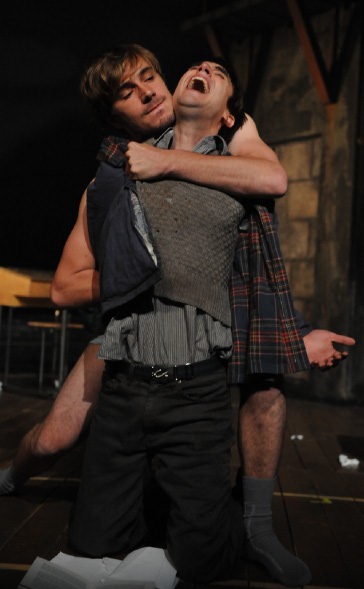
Stefan Butler is well cast as Billy with the look of the scrawny, unloved, unkempt, misfit who always gets caught out or is just blamed on past reputation. No-one is interested enough in Billy to notice the changes since he found his beloved kestrel.
His performance is captivating from his first appearance although his adolescent Yorkshire accent tended to waver and at times developed into Orville Duckese or Corrie's Ashley.
TADPOLE
Peter McGovern was also memorable as Tibbut. His tadpole in the wellies tale would make the strongest listener squirm.
Oliver Farnworth (seen right fighting with Billy, Stefan Butler) is believable as Jud, Billy's brother, as a narrow-sighted, gambling miner who can see no further than the next drunken Saturday night while Daniel Casey gives a sensitive performance as Mr Farthing, the English teacher, even controlling the class with an air of convincing authority.
Kes, the title role, only manages an appearance when it is too late after Jud has exacted his revenge for the unplaced bet.
The attention to detail and 60s fashion was impressive, particularly Mr Farthing's desert boots, corduroy jacket and flannels and Mrs Casper's kitten heels and leather coat while some thought had also gone into the lighting.
A backdrop of Yorkshire landscape changed tones to reflect the mood while thoughtful direction made scene changing part of the story helped by clever sound production while Billy's shadowing spirit and the fight scenes were well done.
There should also be a mention for the pupils of Ounsdale High School, Wombourne for their contribution as Billy's West Riding classmates.
Lynda Ford
Audio Described Performance: Saturday 21 November at 7.30pm.
BSL
Performance Saturday 21 November at 7.30pm
Madam Butterfly still
soaring high
Life in silhouette: Cio-Cio San (Judith Howarth, left) pinned like a butterfly in shadow with her maid Suzuki (Clair Bradshaw) and son awaiting the return of Pinkerton
Madam Butterfly
Welsh National Opera
Birmingham Hippodrome
****
PUCCINI'S Japanese love story is one of the world's most popular and favourite operas and this Welsh National Opera production does not disappoint vocally or musically.
Popular British soprano Judith Howarth as Cio-Cio San might have some difficulty persuading us she is a waif-like 15 year-old Geisha but that is quickly forgotten in her moving and convincing performance as the tragic heroine.
From the demure girl who marries her US naval officer on what is little more than a monthly contract we see her grow in strength from a girl to a woman in love through Act 2 as she awaits the return of her husband.
Howarth, who incidentally played the same role in Anthony Minghella's English National Opera production last year, allows her Butterfly to spread her wings, giving her the hope, the passion and finally the despair and strength to give up her son and take her own life. There is a warmth and colour to her voice which can produce laughter and happiness or pathos and sorrow at will. You could listen to her for hours.
Her Un bel dì (One beautiful day - PODCAST), one of the best known and loved arias in opera, deserved the warm applause as did her jousting with the excellent Neal Davies as the US Consul, Sharpless as he tried to deliver his devastating message that Cio-Cio San's marriage was over.
She was also well supported by her maid, Suzuki in a fine performance by Claire Bradshaw who managed anger and compassion in equal measure as the truth of her mistress's betrayal was exposed.
TRAGEDY YET TO COME
While all this growing up into womanhood was going on in Nagasaki – a city with its own tragedy yet to come - the reason for all the problems, Lieutenant B F Pinkerton, was back in the US of A getting properly married to a proper American girl.
He was the American navy man who came in, bought up a bride with cash and empty promises, and then went off home again leaving everyone in the lurch.
In this reworking of Joachim Herz's 1978 production by Caroline Chaney, American tenor Russell Thomas is a softer Pinkerton and not the heartless villain he is sometimes made out to be – although Watson did get his share of pantomime boos among the applause at the end.
Watson has a growing reputation and a fine voice and showed a nice contrast between the Jack-the-lad confident American who had bought himself a woman in Act 1 and the hesitant, uncomfortable father arriving to take away the son he never knew he had in Act 2.
There was also a clear division between the American who rejects pretty well anything Japanese at the start and his Butterfly who embraces everything American as she falls in love with a man everyone except her can see is a bit of a wrong 'un. Still if she had spotted that at the start it would have been a pretty short Opera.
Mind you, how an African-American from Miami and a Japanese teenager produced a blond, blue eyed child was quite remarkable - and they do grow up fast in Japan. At two-and-a-half he must have been just about ready for under 11 football. Not that it mattered in the great, and enjoyable scheme of things.
ARTHUR DALEY OF NAGASAKI
There was some good support particularly Goro (Philip Lloyd Holtam), the Arthur Daley of Nagasaki, as the matchmaker and then there was the Bronze, the priest played by Michael Druiett. Not as scary as some but he looked a big lad as he delivered his curse, a really big lad. From a distance you might have thought Nikolai Valuev had found himself a new job.
Opera depends as much on the orchestra as the singers, not that you see much of them in the Hippodrome's pit which is aptly named as is descends into the bowels of the earth but under Simon Philippe the orchestra kept things moving along splendidly and sympathetically to both plot and performers.
Reinhart Zimmermann's set was simple and effective, a Japanese house with sliding paper panels emphasising the many layers of emotion in the plot, all under a canopy of lacy cherry blossom in golds and browns.
On surprise was they hardly any attempt had been made to make up characters look Japanese apart from dress. Traditionalists might wonder but after a few moments you didn't notice. In Madame Butterfly the story is the thing and this production tells it beautifully. It returns on Saturday, November 21.
Roger Clarke
http://www.birminghamhippodrome.com
Beanz meanz Wozzeck
Wozzeck
Welsh National Opera
Birmingham Hippodrome
****
BERG'S stark opera about the trials and
tribulations of the poor and one man's descent into madness, murder and
suicide is not easy watching.
This WNO revival of their 2005 staging of
Alban Berg's 1920s classic has the unfortunate Franz Wozzeck in a baked
bean factory rather than the military which makes the story more
relevant.
Britain does not have the same
history of a military society as Berg's Austria or Germany
so the original is an alien world but set Wozzeck in a
factory - and everyone knows where they are and cast and
orchestra make sure everyone is pretty uncomfortable being
there.
The factory with its mind numbing
conveyor belt of baked bean cans, shelves of cans and skips
of ever increasing size of discarded cans conveys the
drudgery and tedium of Wozzeck's life while the staff in
their identical uniforms represent the regimentation of his
days.
He is merely a number who is
bullied by The Captain – his line manager in modern parlance
– experimented on by the Doctor who has him eating a diet of
beans and is delighted when his patient appears to be going
mad, he has a wife who is unfaithful and a job that seems to
consist of pushing two cases of baked beans around on a
trolley.
I must admit I am not a lover of
atonal music but the score under conductor and WNO Music
Director Lothar Koenigs does express the emotions on stage
and the links between the 15 scenes become part of the
story rather than mere fill-in while scenes are changed.
The music becomes an extra character, You know from the discordant
tones, for example, that there is friction between Wozzeck and his wife Marie without a word being sung
while even the supposedly happy, regimented crowd scenes and hunting songs have a disturbing
edge.
Polish soprano Wioletta Chodowicz
as Maria exhibits a huge voice full of power and emotion
with clarity throughout the range while baritone Christopher
Purves, back again as Wozzeck, manages the remarkable range
demanded by the score with ease in a compelling performance
as the put-upon poor man who is slowly ground down until he
snaps, slitting his wife's throat with a jagged baked bean
can lid and the drowning himself in a skip of beans.
Helping compound his misery is
Graham Clark as a quirky, sadistic Captain and Clive Bayley
as a somewhat sinister doctor while Hubert Francis's drum
major, who seduces Maria, is just a nasty piece of work who
beats up Wozzeck for fun.
At the end Wozzeck and Maria are
victims and they are the ones who end up dead with the
perpetrators escaping scot free while, in this version, the
next generation are already taking their place.
It's not laugh a minute or hum
the tunes on the way to the car park stuff, but interesting
nevertheless.
Roger Clarke
Lords of the dance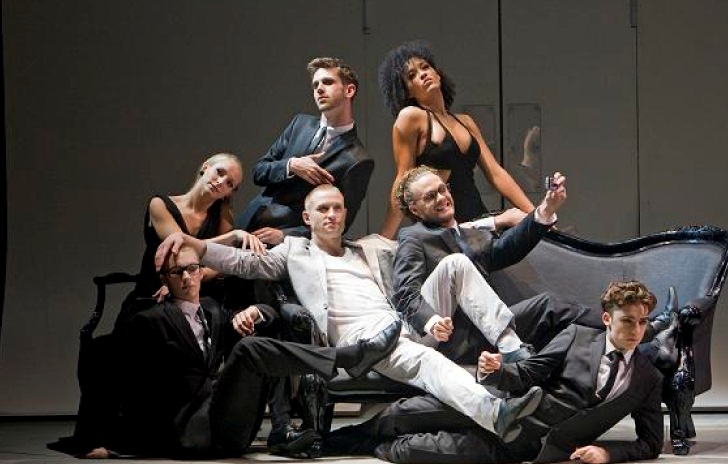
Dorian Gray
Birmingham Hippodrome
****
MATTHEW Bourne has created a piece of theatre, telling a story without words in his modern dance interpretation of Oscar Wilde's only novel.
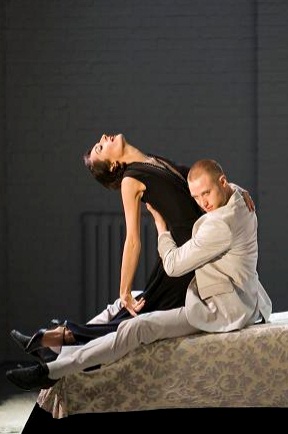
What the story is about is up to the watcher to decide and there was plenty of discussion as to who represented what and why at the interval which, if nothing else, indicates this is a piece that needs to be followed– no drifting off in the boring bits here.
At first glance The Picture of Dorian Gray does not seem
an obvious subject for a choreographer who brought us Play
Without Words, Nutcracker! and Edward
Scissorhands.
It is a dark gothic horror tale of a young man, Dorian Gray who has a portrait painted and the artist becomes infatuated by hi s beauty as does everyone else who sees him including Lord Henry Wotton who convinces Gray that hedonism is the only way to live. Lust and look s are the only things of importance.
Gray enters into a pact that he will keep his youth and looks while his portrait grows old and sets off on a life of debauchery which eventually all goes belly up with a body count to rival Midosmer Murders.
Wilde hints at homosexuality in his novel but there is no such shyness here with homoeroticism, and indeed plenty of good old hetroeroticism, filling every corner of the stage.
Indeed with all
the lithe
intricate linking and movement of the sexual displays it
might have been an idea to have issued a warning not to try
this at home. It will be interesting to see if the number of
people off work with bad backs goes up this week.
FAME, SEX AND DRUGS
Bourne moves Wilde's 1890 story on two centuries and
the artist Basil Hallward, danced
effortlessly by Jason Piper, becomes a
fashion photographer and the lure of modelling and
advertising provide the debauched, vacuous, sleazy lifestyle
of fame, sex, drugs and . . . well that's it really.
Dorian, danced beautifully by Richard Winsor, is the epitome of modern man, in the mould of David Beckham.
He is
plucked from obscurity as a waiter and everyone falls under
his spell as the new face of men's perfume Immortal
pour homme launched
by the fashion house run by Lady H, Wilde's
Lord Henry reinvented as
Lady Henrietta
He becomes toy boy to Lady H, danced seductively by Michela Meazza, pictured above with Winsor,finds himself on a send up of Jonathan Ross, complete with his four puffs this time without a piano, and descends into an ever more narcissistic and debauched vision of the world of celebrity.
His room collects the trappings of wealth with works of art and Damien Hirst's crystal skull appears as a glitter ball in a nightclub as the descent quickens to the inevitable conclusion as the posters and Dorian's world fall apart with a body count to rival Midsomer Murders
C
In the book Gray stabs to portrait after
first dispatching the artist. Here he smothers his
doppelganger, Jared Hageman, before popping his dancing
shoes with the final scene the ultimate in a celebrity
culture – the hooded, sinister paparazzi are ushered in to
tell the story to the world.
The set, by Les Brotherston, is magnificent. A huge white, painted brick warehouse with a revolving centre wall which changes scenes and mood in an instant on a stage all helped by Paule Constable's
clever lighting to convey everything from photographic studio to nightclub.There are some clever video graphics,
particularly in one scene between Dorian and Basil which
needed split second timing while the whole thing was danced
to urgent, pulsating music composed by Terry Davies and
played by an excellent band of five.
The cast of 11 dancers were superb in a piece which had some humour, Dorian's five in a bed for example, but inevitably dance could not display the wit of Wilde's original.
But it is a serious piece of theatre and
one where so much is happening in so many parts of the stage
that you have to watch all the time.
Bourne said last night it was a piece he wants people who are not really interested in dance to appreciate and in that he succeeded with ease.
To 14-11-09Roger Clarke
|
Cuckold, old story Centre of attention: Hilary (Liza Goddard) finds marriage is no defence against American oilman Charles Wolverhampton Grand **** WHEN your wife's trip to London is more amorous than Harrods then what is a chap to do. Weill if you are the Earl of Rhyall I suppose there is only one thing for it; you challenge the bad egg to a duel after a game of billiards.
It all started when the Earl's stately home was opened to the public at
half a crown a pop to make ends meet and Charles, a calculating American
millionaire (Jack Ellis), leaves the tour and intrudes upon her
ladyship, Hilary (Liza Goddard) in the private apartments. Charles is not particularly likable and perhaps the flaw in the whole play is that, with 20 years of marriage and two kids behind her, Hilary falls hook, line and sinker for the charms of a few bob and a jet-set lifestyle all in the space of half a dozen lines of dialogue. Victor, the Earl, a splendid example of traditional English gentry in the hands of Christopher Cazenove, (pictured right) finds himself with a dilemma. He knows of the affair and everyone else knows he knows but it is not the gentlemanly thing to do to make a fuss despite the fact he declares he cannot live without Hilary. COMPLETE WITH GOSSIP Hilary has been staying in London with her old friend Hattie (Sophie Ward) who is one of Charles' old flames who refuses to go out, and when Hattie just happens to arrive unexpectedly at the stately pile complete with all the gossip, Victor with the help of his butler Sellars, splendidly played by Giles Fagan, hatches a plot to win back his wife and spike the American's guns. The play, by Hugh and Margaret Williams, is 53 years old now and has not been performed as often as it perhaps deserves because of the politically correct climate we now live in. It's not the theme of adultery or anything like that which raises eyebrows any more but the fact a key component of the plot as a coat of wild mink which was every girl's idea of the ultimate romantic gesture in the 50s when the play was first produced. The coat used in the production is artificial by the way before anyone rushes for their placards. Half a century on the play has stood the test of time well although younger members of the audience may have to have half crowns and guineas explained to them. The drawing room set is superb and the excellent cast of five produce a clever romantic comedy with some wit and charm in what is a traditional piece of theatre. A combination which provides a very enjoyable, evening. To 14-11-09 Roger Clarke |
|
It's Meldrew the magnificent - so you'd better believe it! 
Twelfth Night The Royal Shakespeare Company ANYONE who ever stared through the classroom window to escape a double period of Eng Lit as bored voices read tired old Shakespeare should get along to Stratford and see what they missed. The RSC production of Twelfth Night is Shakespeare at its finest: witty, clever, imaginative and above all gloriously funny. Those dull old pages from dog-eared school copies spring to life as we see a tale of unrequited love, mistaken identity, the original men behaving badly . . . behaving badly . . . in a tale where everyone lives happily ever after. Well almost everyone. Richard Wilson's Malvolio does not exactly get the rub of the rialto. Wilson is a superb Malvolio who is often portrayed as just as the pompous face of officialdom who is brought down a peg or two. FOOLISH OLD MAN
Wilson's Malvolio is more human. We see the pompous, right enough, and
the ridiculous as the love struck head steward goes a'courting in his
yellow stockings all cross gartered with an inane grin. But Wilson also
gives us pathos as the foolish old man realises he was the butt of not
just a joke but an act of revenge which had got out of hand. The jokers are led by the excellent Richard McCabe as Olivia's uncle, Sir Toby Belch. (Right with James Fleet as Sir Andrew Aguecheek)Belch may be the name but it was the other end which was the more . . . expressive as the flatulent Sir Toby staggers his drunken way through proceedings spreading mayhem and havoc wherever he goes ably assisted by Olivia's maid Maria ( Pamela Nomvete) and servant Fabian (Tony Jayawardena). Add to that fine trio James Fleet's Sir Andrew Aguecheek, who looks like Don Quixote on a bad day and makes Fleet's Hugo in The Vicar of Dibley look almost sensible, and you have everything you need for comedy and Gregory Doran's fine direction exploits every line to the full.
The garden scene when Malvolio finds Olivia's letter, with Belch,
Aguecheek and Fabian hidden in the box tree is worth a play - even a TV
series - all on its own. Throw in a fourth aging delinquent in Olivia's
late father's favourite fool, Feste, and Malvolio hardly stands a
chance. Miltos Yerolemou plays the role with obvious relish and a touch of evil as a peevish little jester, a malevolent hobbit, but the audience warm to him. Perhaps he got them on side with his novel end to the interval with an audience participation which perhaps owed more to the mud of 1969's Woodstock than Elizabethan England or even Illyria, where the play is set. Illyria was thought to be in the Adriatic and the dress does have a Baltic, Turkish feel to it in the lavish costumes and set of Doric columns and towering wall of spalled brickwork. Clever lighting and a single window make one set all things to all men. Memorable performance Orsino , the Duke of Illyria, who has Olivia in his romantic sights shows some nice comic touches in the hands of Jo Stone-Fewings while Alexandra Gilbreath as the feisty Olivia can fill the stage with raging fury or riotous laughter all in the space of a sentence in a memorable performance. Nancy Carol (left) is a delight as Viola and, along with Sam Alexander as her twin Sebastian, she kept the subterfuge of the main plot bubbling nicely. The two were similar enough to make mistaken identity credible even to the audience which is not always the case. There were fine individual performances but this was as much a team effort where everyone played their part with even the smallest gesture and detail adding to the performance from a shrug of the shoulders from the Priest to the gobsmacked attendant servants when Sebastian turns up. The many parts making one glorious whole. Twelfth Night runs until November 21 and then transfers to the Duke of York's Theatre in St Martin's Lane from 19 December 2009 to 27 February 2010. All photographs by Ellie Kurttz and copyright RSC Roger Clarke
Ticket hotline: 0844 800 1110. |
Oldest game still playing well
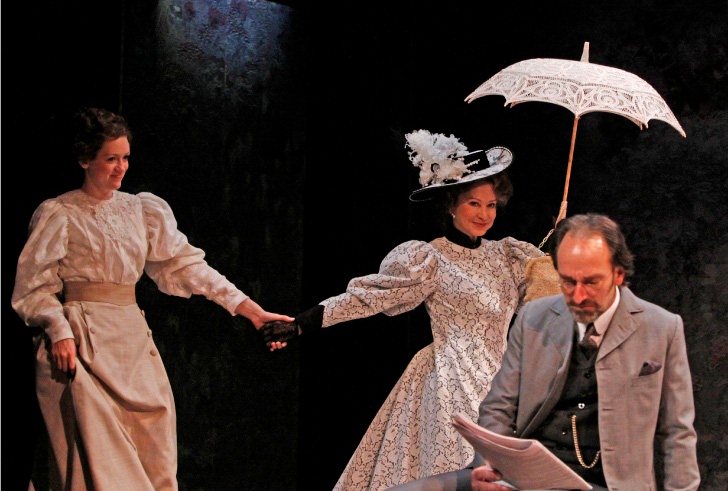
Secret garden: Vivie (Lucy Briggs-Owen) and her mother Mrs Warren (Felicity Kendal) with Praed (Mark Tandy)
Mrs Warren's Profession
Birmingham Rep
****
DEAR Mrs Warren's profession is a rather old
one, the oldest some might say, but the cast of six give George Bernard
Shaw's infamous play a fresh lease of life in this splendid production.
Then there is the local rector, the Rev Samuel
Gardner (Eric Carte) who perhaps has known Mrs Warren a little too
Biblically in the past and who seems to share rather more than just
secrets with house guest Sir George Crofts (David Yelland) who thinks
money can buy just about anything, including Vivie.
Drifting through it all like a butterfly on a breeze
is another guest, the artist and architect Praed (Max Bennett) who
prefers to see the best in everyone and wants to sail through life's
rich canvas as if it really is all a painting,
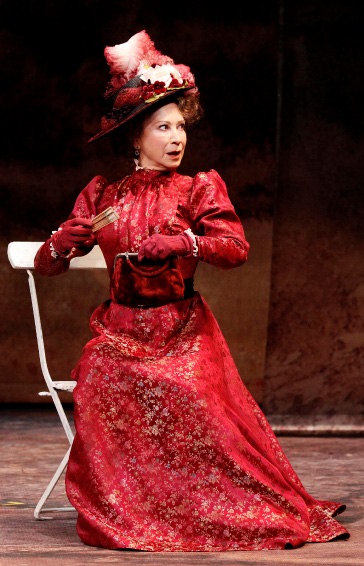
The whole point of the play had been missed, the
hypocrisy and the capitalist system – Shaw was a great socialist – which
forced women into prostitution in the first place. We even had the
strange dilemma of Mrs Warren, once exploited and now exploiter, finally
siding with the capitalist ideal which had forced her on to the game in
the first place.
Today the play still has elements which ring true
with the exploitation of workers and the idea that money is not just the
most important thing in the world but, as we have seen with our
wonderful bankers, it is the only thing of importance – at least as far
as they are concerned.
The play is not a comedy but it does have some funny
lines including my favourite from Mrs Warren who, when confronted with
her past declares, it is “only good manners to be ashamed of it”.
The second half becomes much more serious though
after all the verbal sparring in which all the somewhat dog-eared cards
are laid out on the table with Kendal exploding, shocking the audience
with the ferocity of her indignation, as she justifies her past and why
she did it.
It is all too much for the sensibilities of Vivie
who escapes to the world of actuarial valuations which must make a good
substitute for Mogadon.
With everything out in the open mother, daughter and
would be suitor Frank all have to make their own decisions according to
their own morality with the uncomfortable Praed looking on and Shaw does
not disappoint.
If there was a fault it was perhaps with the sets on a stage which was at times too big for the more intimate scenes in the cottage and an actuary's office but that was hardly a distraction from fine performances all round with Kendal showing she she is at the top of her profession. To 14-11-09
Roger Clarke
Rocky still rocking in
the aisles
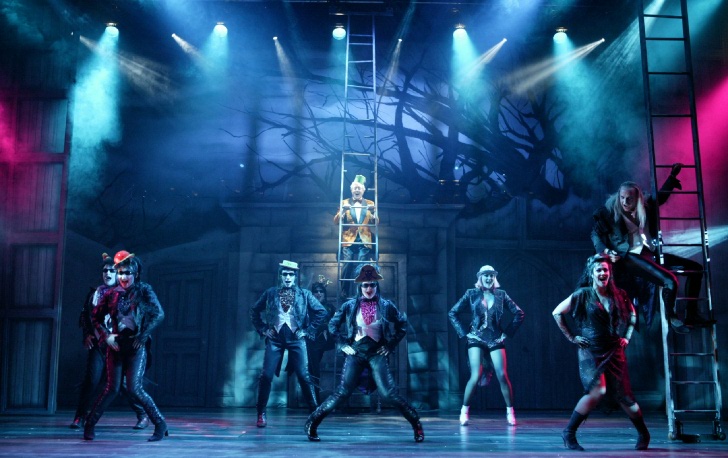
Rocky Horror Show
Birmingham Hippodrome
*****
BIRMINGHAM Hippodrome laid siege to the senses last night with the
opening of Richard O‘Brien's masterpiece The Rocky Horror Show.
To some he is Riff Raff from the film version of the 1970's to others he
is the host of the legendary Crystal maze, but to all I think he
should be considered
quite brilliant.
When someone says Rocky Horror Show, one's mind is prone to jumping immediately to images of stockings and suspenders and for good reason...they're everywhere. From the cast, to the audience members and they come in all shapes, sizes and genders. The show is less a production more an event.
If you don't know the show you'll certainly know the signature tune, The Time Warp, from a thousand weddings and boozy office Christmas parties.
I should say, at this point, that I am not an aficionado of the Rocky Horror show and indeed it was with a feeling of mild trepidation that I entered the auditorium. The evening starts well before the first song. Audience members are less paying punters and more willing participants along for the ride. Many are dressed up in costumes from the show and participation is expected (although this has been limited to more verbal interaction by some theatres due to a barrage of things being thrown at the stage).
The Hippodrome staff were a credit though, seeming particularly jovial.
All this combines to ensure that there is a true feeling of camaraderie
throughout the theatre. It seems strange to write a review and be
mentioning the audience to such a degree, but they really are a part of
the show and it feels very special as a result, this is an ensemble
piece in its purest form.
NO WEAK LINKS
When writing a review it is sometimes difficult to
pick out positives, here I find myself sifting through a deluge of them.
The cast were excellent with no weak links at all save a few missed
dance steps, though I must admit the same complaint could be levelled at
your reviewer.
David Bedella was exceptional and arguably stole the show as Frank ‘N' Furter. He commanded the stage and worked the crowd with real craft, and all in heels. Ainsley Harriott was engaging as the narrator and showed that he has lost none of the comic timing that he honed as part of the double act, The Calypso Twins, in the early 1990s. Special mention goes to the best couscous related comeback to a heckle I have ever heard, and I've heard a few, well two - but it's still good.
The
costumes and set designs are as stimulating in their execution as they
are brilliant in their simplicity, with beautiful touches that you could
miss in an instant but we as an audience are treated to as if a child
being let in on the magicians secret. This is aided and abetted by
the use of periphery characters (phantoms) doubling up as stage hands
and funny ones at that.
The
use of the live band gave a real edge to the sound and were perfectly
balanced for solo pieces and energetic ensemble pieces alike. It
is a credit to the entire production that nearly every song was met with
rousing applause and justly so.
ELOQUENTLY FILTHY
The night I went there were some young children at the performance.
This, I would say, is at the parent's discretion as there are adult
themes in the piece. And yet all is not quite what it seems. Yes it is
explicit in some of its scenes and yes its language can be coarse, but
it is never offensive, angry or unkind instead it is eloquently filthy.
The message of the piece is one of tolerance and that can't be a bad
thing.
If I have one complaint, it was that the use of smoke near the end made me feel like that I was in a Bonnie Tyler video; that and the fact my £7.93 Primark Basque (bought especially for the occasion I hasten to add) does not seem made for a 6ft 3”, 13 Stone, 30 year old male . . . who knew!?
It may sound like I am gushing somewhat but if you have read any of my previous reviews you will know that it is no mean feat for me to give such high praise. I cannot recommend the show, or more the experience, highly enough. And while it hasn't converted me to cross dressing, it was certainly a lot more enthralling than a standard trip to the theatre. Overall I think you will get out what you put into this show. As the show so masterfully puts it don't dream it, be it! Truer words were never written.
Christian Clarke
Interviews and show video Opening night audience - where you there?
Top News Reviews Home
Mrs Bennet leads the way Mrs
Bennet (third left) and her daughters take a stroll in The Circus,
Bath's stunning circular Regency terrace.
Mrs
Bennet (third left) and her daughters take a stroll in The Circus,
Bath's stunning circular Regency terrace.
Birmingham Rep
****
SUSAN Hampshire brings the sort of quality to this production you could not buy.
That being said, if it was on sale her Mrs Bennet would have bought gallons of the stuff and bathed all her five daughters in it as she tried everything bar buy one get one free to see them married to fine young men.
Fine, of course, being an income of several thousand a year which put the recipient in the banker class back in 1813 when Pride & Prejudice first rolled off the presses.
Jane Austen's novel is one of the best known in the
English language and came second to The Lord of the Rings in a BBC poll
to find the UK's best loved book in 2003 and with films, TV and stage
adaptations and numerous spin offs, including Pride and Prejudice and
Zombies published this year (honest, £3.59 on Amazon, get your copy
now!) there is a lot to live up to.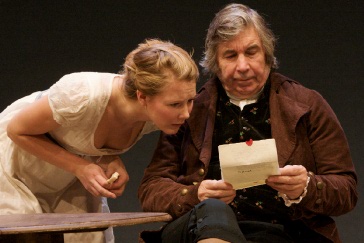
In the main this Theatre Royal, Bath production, adapted by Simon Reade, manages to stand comparison well. Director Toby Frow manages to keep the action moving at a decent pace with scene changes around the actors and some nice touches, particularly the Regency version if the instant meal and the balloon backed family portraits and I quite liked the MFI grand piano with the bits missing from the box.
Christopher Woods' set is simple and uncluttered and leaves the stage to the actors which is how it should be.
INDEPENDENT MINDED
Hampshire steals the show as the prattling, fussy, mother hen Mrs Bennett but that is not to say she is not well supported. Katie Lightfoot is excellent as the feisty, independent minded daughter Elizabeth who refuses to marry the Mr Bean of country parsons, Mr Collins, who is played for well deserved laughs by Tom Mothersdale.
She knows what she wants and it is not Mr Bean nor is
it that arrogant, unfeeling, infuriating Mr Darcy – except most of the
audience know better of course.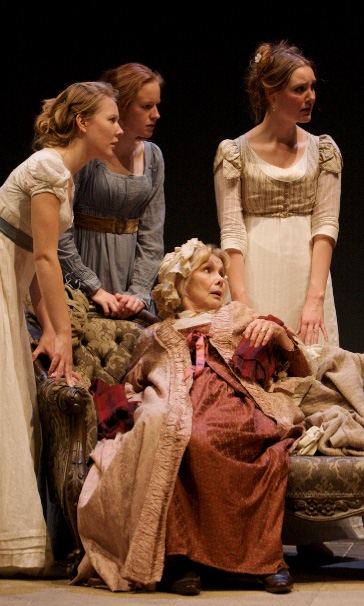
Nicholas Taylor makes a fair fist of Darcy, whose uneasy love of Elizabeth is the real story of a book originally called First Impressions. It is not an easy character. Darcy has to come over as aloof and, to be honest, a bit of a stuck-up prat to start off with and it is hard to give him enough flesh on the bones in the time available to bring about a stunning transformation, particularly as despite £10,000 a year, he only appears to have one set of clothes.
Had everyone not known he was really a goodie from the off it might have been more difficult to warm to him when the everyone living happily ever after bit came around and he and Elizabeth pledged their troth until death, or at least the end of the run, do them part.
It is much easier on TV or film where close ups of facial expressions, eyes and glances can help capture the troubled soul of a man struggling with love.
Much simpler is the other love story in the book. Alex Felton froths about the stage as the eligible Mr Bingley, only a mere £4,000 a year mind – Mrs Bennet gets to us all eventually – who provides the sub-plot of happiness to heartbreak back to happiness again with eldest daughter Jane, sympathetically played by Violet Ryder.
Meanwhile Peter Ellis is suitably stern with a soft heart as Mr Bennet trying to keep his daughters on the straight and narrow and protect them from his wife's matrimonial enthusiasm.
There were a few fluffed lines in one scene, the finger on the old MP3 player was a bit quick off the mark at times, with music clipping the end of lines but all in all it was a creditable adaptation and an enjoyable evening.
Just as an aside, it is funny what little details you spot in a production, the things that catch your eye. For instance even in Regency times soldiers carrying a body on their shoulders would have done it military fashion which is opposite feet, inner and outer, rather than as it was in the production, in step left and right.
I should get out more . . .
Roger Clarke
Pictures:
Top left: Victoria Hamnett as Mary Bennet and Peter Ellis as Mr Bennet
Below right: Victoria Hamnett as Mary, Katie Lightfoot as Elizabeth, Susan Hampshire as Mrs Bennet and Violet Ryder as Jane
Neil shines as Rain Man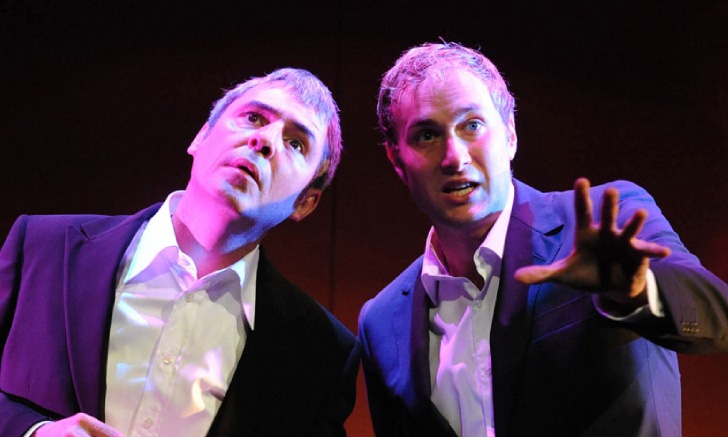 Brothers
in the making: Neil Morrissey, left and Oliver Chris
Brothers
in the making: Neil Morrissey, left and Oliver Chris
Rain Man
Wolverhampton Grand
****
A STANDING ovation probably says all you need to know about Rain Man. It was funny, sad and time just flew by as Neil Morrissey and Oliver Chris took the audience on the familiar voyage of discovery in this Dan Gordon adaptation of the much loved 1988 Oscar winning film which starred Dustin Hoffman and Tom Cruise.
Chris (The Office, Green Wing) plays Charlie Babbitt, a wheeler-dealer chancer whose only concern is himself. Charlie is deep in financial trouble with a car deal going belly up when his millionaire father, who he has not seen or spoken to in years, dies and he finds the bulk of the estate is left in trust for some unknown beneficiary.
When his discovers the beneficiary is a brother he never knew he had, an autistic savant in an institution, he kidnaps him in the hope of forcing the trustee, Dr Breuner, into coughing up with half the estate.
The play is all about the transition of Charlie from the brash, self-centred, dodgy car salesman who takes a patient he despises as a hostage for cash in to someone who discovers feelings for the first time and who finds he cares for his brother, Raymond – the Rain Man of his childhood.
SIMPLY SUPERB
Chris manages that with aplomb but it is Morrissey as Raymond who is a revelation. Anyone who thought he was that sitcom actor from Men Behaving Badly can think again. He is simply superb. It is a part which demands total concentration, full of repetitive twitches, rhythmic rocking and constant hand gestures all the time he is one stage, which is the bulk of the play. Raymond is in his own ordered world no matter what is going on around d him.
As for his dialogue? It never quite fits with what is going on so there is no flow for Morrissey to follow and even the laughs do not come easy. Raymond has some very funny lines but he doesn't know it.
He does not understand jokes or humour so the delivery has to be alien to everything you ever learned about comedy, not so much dead pan as dead mind. Morrissey manages a performance which is both believable and at times moving - as well as one which gives him neck and back ache from his awkward posture as Raymond.
Few of the people who go to see the play will know someone who is autistic and rarer still will be those who know an autistic savant but this is not a play about the disorder it is about the awakening of Charlie's feelings and his realisation that his brother is worth more than money.
LESS SENTIMENTAL
The brothers are well supported by Ruth Everett as the girlfriend Susan and Charles Lawson as Dr Breuner who runs the institution where Raymond lives and who was his only friend until Charlie arrived on the scene.
The story has not changed but the play is less sentimental than the film as perhaps it had to be to work on stage.
Jonathan Fensom, the designer, has created an inventive set of moving walls which changes around the characters in a nifty piece of direction by Robin Herford which both speeds up scene changes and helps continuity as we follow Charlie and Raymond on their road trip to Los Angeles through the motel rooms of America.
There is a detour to Las Vegas thrown as Charlie uses his brother as he has used everyone else he has ever met but somehow this time we can all see something is different. Charlie is starting to care.
Prepare to laugh but have a tissue or two just in case for a performance worth the ovation at the end. To 7-11-09
Roger Clarke
REVIEW
Still flying
high
EVITA
Birmingham Hippodrome
****
WHEN people hear the word Evita, it immediately conjures up three things, Andrew Lloyd Webber (lovely music shame about the face), Tim Rice (expert Lyricist and to some that nice man off Countdown) and invariably Madonna (God save us, before she adopts us all), thankfully the Hippodrome serves up only two out of three.
That is not to say that I have anything against Madonna. . . all right, yes I have plenty against Madonna, as I think is only sane and just . . . but I digress.
The production is as slick and seamless as
you would expect from the Lloyd Webber/Rice brand forever attached to
it. The scene changes whether performed by cast members or stage crew
are almost balletic in their execution. The musical numbers are rousing,
delicate and clearly eagerly anticipated by many of the devoted crowd;
On This Night of a Thousand Stars, Rainbow Tour, She Is a Diamond
and You Must Love Me all standing out . After all one must
remember that this musical made its debut in 1978, that combined with
the 1994 blockbuster has ensured that a firm fan base is ever-present. As a production it has commercial clout, it has powerful songs and
provocative, rich subject matter and an undoubtedly talented cast. . .
and yet for no discernible reason it doesn't quite work.
As a production it has commercial clout, it has powerful songs and
provocative, rich subject matter and an undoubtedly talented cast. . .
and yet for no discernible reason it doesn't quite work.
That is not to say that the cast are without merit. Rachael Wooding's Eva (left) captures the transformation from naïve country girl to captivating figurehead with a subtlety and power that is let down only by her failure to fully connect with the audience, preferring sometimes to address the audience with a somewhat distant panning glance, when she was so close to commanding them. That said her delivery of the standard Don't Cry for me Argentina was fabulous and rightfully received sustained applause.
James Waud, as Magaldi, engaged the crowd superbly especially given that it was his first professional show, which more than made up for his occasional vocal shortcomings and Mark Heenehan plays the malleable, but ultimately loving Peron with a impressively deft touch.
The Narrator of the
piece is Che, played by Seamus Cullen, who as grannies around the
country will no doubt know reached the top ten of Any dream will do in
2007.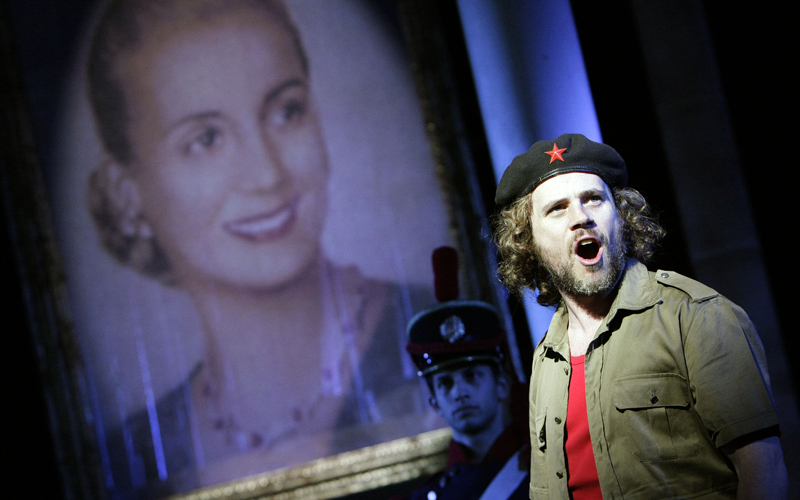
The character was originally intended as an Argentinean Everyman, but since the very first production has morphed into Che Guevara, albeit one that on this occasion looks like something from a stag party gone awry.
Cullen (right) is likeable, and as a narrative device and the physical embodiment of conscience of the people that may have been enough. But there seems little point in employing such a iconic and influential historical figure as Guevara if the actor cannot capture some of his gravitas. This is a difficult balancing act to pull off I grant you, for it is undoubtedly Eva's piece, but in my mind it falls short and detracts from the piece; his diction is a little too clear and his soul a little too unruffled for the audience to follow him unconditionally. And for a man who supposedly speaks for the people his near voyeurism seems oddly self serving.
Special mention must be saved for Carly Bawden who was outstanding in her role as the mistress. In a relatively short appearance, she demonstrated a vocal skill and stage presence that surely has her destined for greater things.
The company excelled throughout and though the sound occasionally left duet and group pieces slightly muddled the Hippodrome was a fine setting for the piece.
Andrew Lloyd Webber once said that Eva Peron was “easily the most unpleasant character about whom I have written”, yet for all interest that this one sentence arouses, none of this ever really filters through into the show. I cannot deny that there was a smattering of standing ovations at the end, and while I would agree that they were justified for some of the cast I would say the production didn't quite merit it.
Having said that none of the avid fans seem to mind and I'll be dammed if I can get Don't Cry For Me Argentina out of my head since I left the theatre, so maybe that's enough. To 17-10-09
CHRISTIAN CLARKE

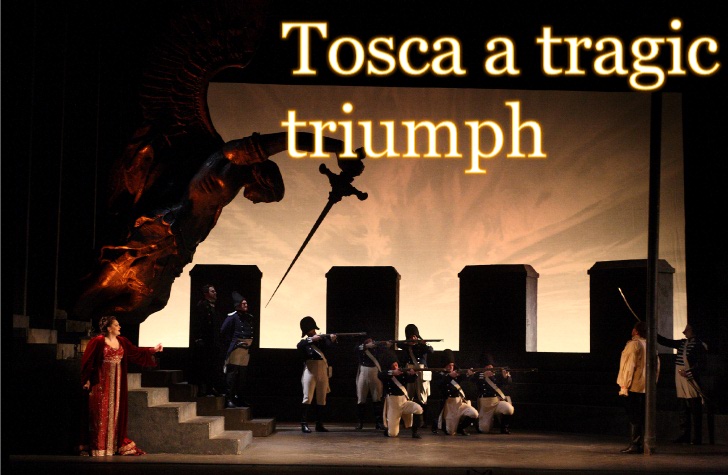

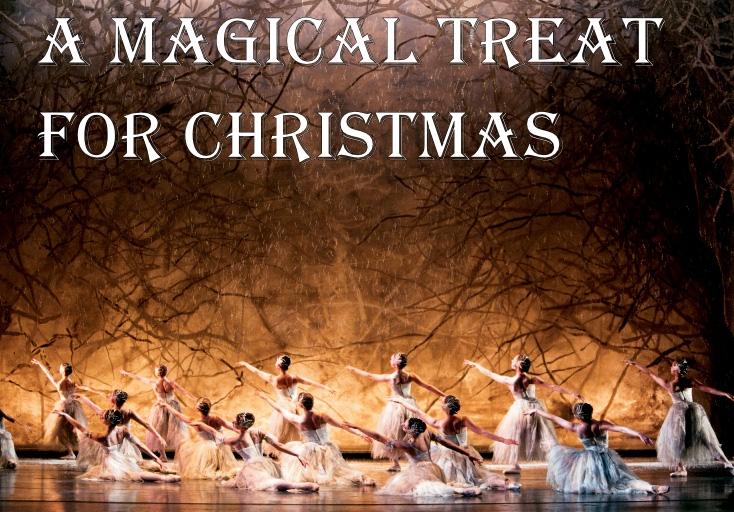 The Nutcracker
The Nutcracker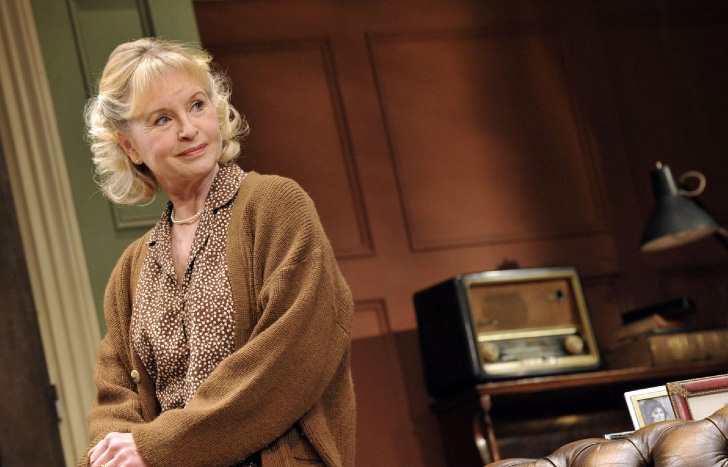
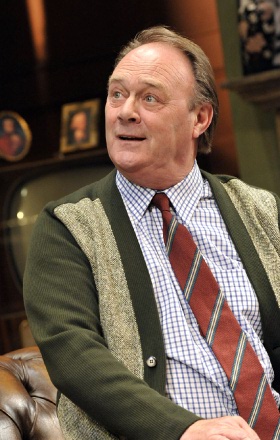
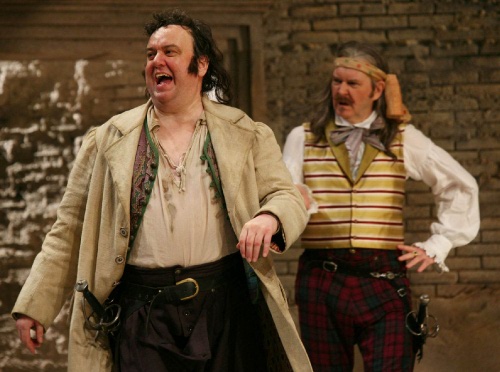
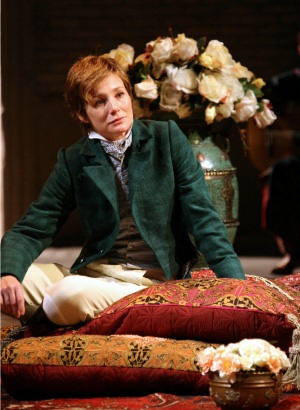


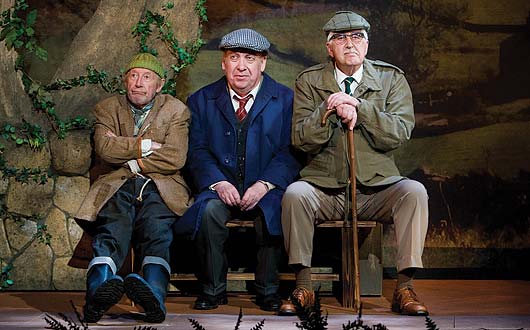 off
the planet and don't know anything about it, the world's longest running
sit com started in 1973 on the splendid Comedy Playhouse (how we need
that now) and 30 series and 289 episodes later,
off
the planet and don't know anything about it, the world's longest running
sit com started in 1973 on the splendid Comedy Playhouse (how we need
that now) and 30 series and 289 episodes later,
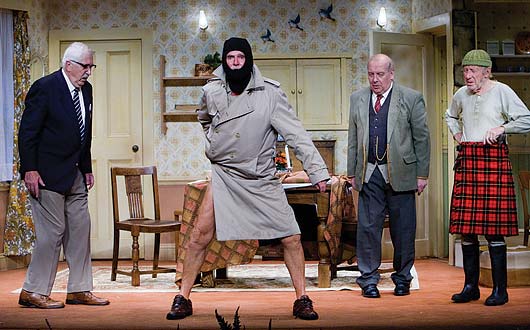 Howard
(Ian Marr) and Marina, the illicit lovers, made the briefest of
appearances with no lines of note but still the audience cheered. Even
Nora Batty (Estelle Collins) and Wally (Marr again), who seem to be
included much to say they were there rather than add anything useful,
brought a ripple of recognition and expectation.
Howard
(Ian Marr) and Marina, the illicit lovers, made the briefest of
appearances with no lines of note but still the audience cheered. Even
Nora Batty (Estelle Collins) and Wally (Marr again), who seem to be
included much to say they were there rather than add anything useful,
brought a ripple of recognition and expectation.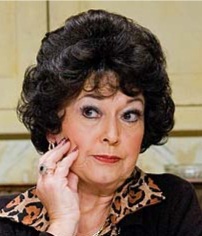 to find a way through to return to the stage - and the script.
to find a way through to return to the stage - and the script.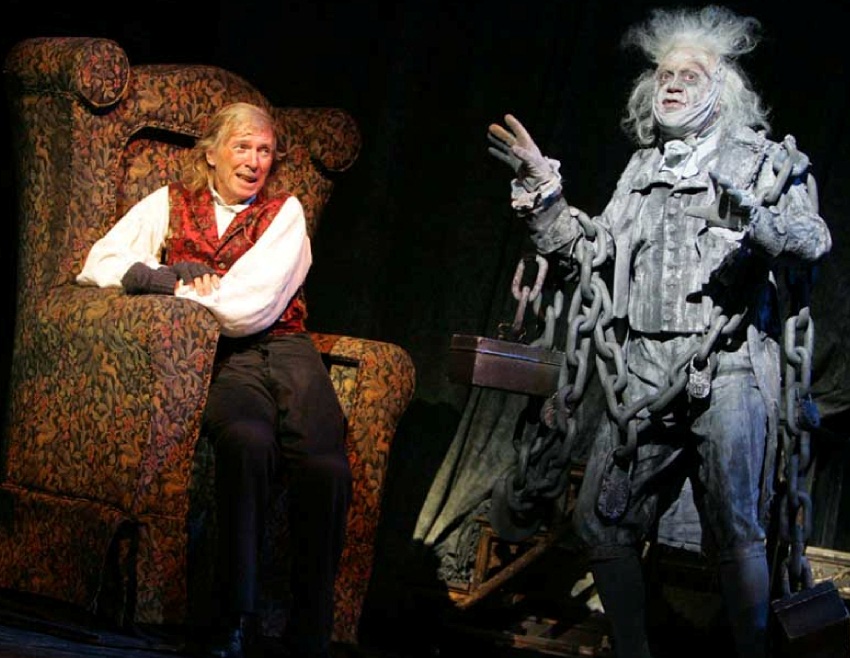 Everyone knows the story which is based on Charles
Dickens' A Christmas Carol – if you don't then: “Welcome to our planet
and I hope you enjoy your stay”.
Everyone knows the story which is based on Charles
Dickens' A Christmas Carol – if you don't then: “Welcome to our planet
and I hope you enjoy your stay”. 